
Parchmentthe DUBLIN SOLICITORS BAR ASSOCIATION MAGAZINE | AUTUMN 2022 | ISSUE 93 DSBA.IE Privacy and data protection issues DRONES AND THE LAW NEW LAW SOCIETY DIRECTOR MARK GARRETT CROSS-EXAMINED STATUTORY SICK PAY FROM 2023
By consolidating your systems, LEAP provides access to the same single set of data across your practice whether working remotely or in the office, preserving consistency and compliance across your law firm.
With all your client and matter information and system centralised in the Cloud you can focus on serving your clients and practising law, not on time-consuming admin.
Work more efficiently and more accurately.
Helping law firms to work more efficiently and more accurately with a single source of truth.
leapsoftware.ie
Welcome to the autumn edition of the Parchment. Ken Murphy’s big shoes have been filled by Mark Garrett – the new Director General of the Law Society. In this edition, Keith Walsh catches up with the new DG and discusses his life and times together with his plans and vision as he now leads the profession forward. The Parchment wishes Mark all the very best for the road ahead.

This edition sees a host of articles relevant to practice and penned by leading solicitors in their fields. If you have ever looked up to see or hear a drone overhead, perhaps buzzing in or around your home or office, then you will be interested to read Oisín Tobin and Conor Califf ’s article on the law pertaining to drones.


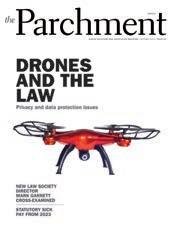




Catherine O’Flynn delves into the new Sick Leave Act 2022 and the implications for employers and employees while Julie Doyle meets up with Maree Gallagher, the food law expert and current President of the British-Irish Chamber of Commerce.







This Parchment edition sees the restoration of some social and educational events that were taken for granted by many in previous years. In-person DSBA seminars have returned to great success whilst the DSBA annual conference took place in Portugal in September. We have seven pages of photographs of these events and seminars and it shows that there is nothing quite like meeting up with colleagues in person.
The Parchment could be accused in this edition for being biased to one particular West of Ireland county. Mayo natives Keith Walsh and Julie Doyle interview double Mayo connected interviewees Mark Garrett and Maree Gallagher – a coincidence of the highest order and no way reflects any bias to my own native county!
John Geary jvgeary@gmail.com



EDITOR
PARCHMENT COMMITTEE
PUBLISHED BY
The
necessarily
DISCLAIMER
ADVERTISING ENQUIRIES
although every effort
made
advertisements, readers are advised that the association cannot be held responsible for the accuracy of statements



or the quality of the goods, services and courses advertised.
All prices are correct at
time of going to press. Views expressed are not necessarily those of the DSBA or the publisher. No part of this publication may be reproduced in any form without prior written permission from the publishers.
From the Editor WHEN YOU HAVE FINISHED WITH THIS MAGAZINE PLEASE RECYCLE IT. Autumn 2022 dsba.ie the Parchment 1
AVRIL
MANGAN
CIARA O’KENNEDY Chair of Employment Law Committee
DSBA COUNCIL 2021/2022
John Geary
Gerard O’Connell (Chair) Keith Walsh SC Áine Hynes SC Julie Doyle Kevin O’Higgins Stuart Gilhooly SC Joe O’Malley Killian Morris COPYRIGHT The Dublin Solicitors Bar Association
The Dublin Solicitors Bar Association, Unit 206, The Capel Building, Mary’s Abbey, Dublin 7 DSBA OFFICE, T: 01 670 6089 F: 01 670 6090 E: maura@dsba.ie DX 200206 Capel Building W: www.dsba.ie
Sharon Hughes T: 086 871 9600
DSBA, its contributors and publisher do not accept any responsibility for loss or damage suffered as a result of the material contained in the Parchment.
Advertisements are accepted at the discretion of the magazine which reserves the right to alter or refuse to publish any item submitted. Publication of an advertisement in the Parchment does not
signify of cial approval by the DSBA, and
is
to ensure the correctness of
made
DIEGO GALLAGHER DSBA President SUSAN MARTIN DSBA Vice President MATTHEW KENNY Treasurer PAUL RYAN Honorary Secretary
NIALL CAWLEY Programmes Director
KILLIAN O’REILLY Chair of Litigation Committee
JOAN DORAN Chair of Practice Management
GERARD O’CONNELL Chair of the Parchment Committee
RONAN McLOUGHLIN Chair of Property Law Committee
JESSICA HICKEY Chair of Probate & Tax
CIARA HALLINAN Chair of Criminal Law
The DSBA
has moved….
After several years on Dawson Street, the Of ce of the DSBA has moved to the Capel Building, Dublin 7. Please note our new address and DX below:
EIMEAR O’DOHERTY Chair of Inhouse PATRICK LONGWORTH Chair of the Younger Members Committee
Contents
Drones and the Law
With drones now a frequent sight in the sky overhead, they pose many questions in respect of privacy and data protection.
Oisín Tobin and Conor Califf look up and identify the issues
Leading the Way
Keith Walsh interviews new Director General of the Law Society Mark Garrett

Tips and Gratuities
Michelle Ryan examines the Payment of Wages (Amendment) (Tips and Gratuities) Act, 2022
Paid Sick Leave is now the Law
Catherine O’Flynn assesses the new Sick Leave Act which was signed into law in July 2022
Residential Tenancies Law Update
Jeremy Erwin and John Deignan summarise two recent pieces of legislation that have been the subject of signi cant and current public debate
Food for Thought
Julie Doyle interviews Maree Gallagher, lawyer and President of the British-Irish Chamber of Commerce
Menopause in the Workplace
Sinead Morgan looks at the increased discussion around menopause, its impact on female employees and the workforce in recent years
Dublin Solicitors Bar Association

Unit 206,The Capel Building, Mary’s Abbey, Dublin 7, Ireland
Government will look behind you and ask who is with you, when we have an important issue, we ask who are our allies, if we have none, we have to ask why page 12
LEADING THE WAY... MARK GARRETT
2 the Parchment Autumn 2022
6
12
T: 01 670 6089 E: info@dsba.ie W: www.dsba.ie 12 20 24 28
32 38
Debt Recovery Update

Harte analyses the
recovery
recent
Time Matters
Joanne Ryan and Lulu Trainor
a recent Court of Appeal that dealt with Inordinate and Inexcusable Delay
Dishonesty and Misconduct
Aisling Ray considers a recent Court of Appeal decision regarding dishonesty in the solicitor’s profession
Leadership in the era of Remote Working

Dr Melrona Kirrane explores the challenges for leaders and sets out
key ideas
Consumer Representative Actions Take Shape
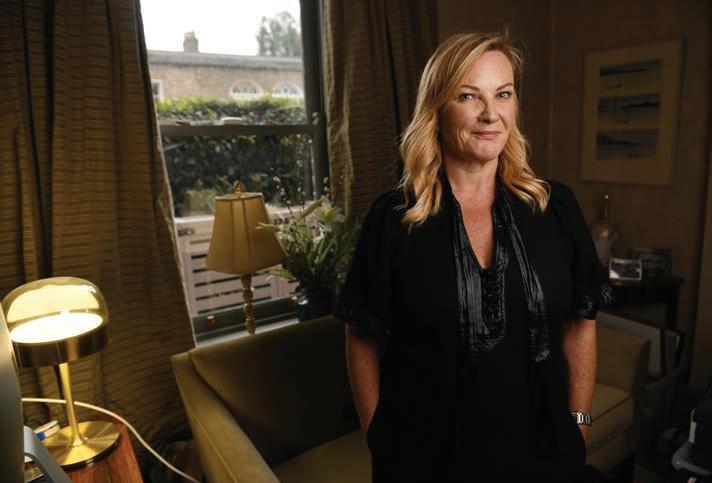
Murphy-O’Connor and Róisín Peart look
third party
New Directors’ Duties
Note
Osborne
legislation
Contents 01 Editor’s Note 04 President’s Message 42 News 57 Photocall Autumn 2022 dsba.ie the Parchment 3
Jason
debt
position arising from the
Courts Service Annual Report
review
ve
Julie
at the issue of
funding in Ireland
–Take
Lorna
probes new
that gives Directors new duties REGULAR FEATURES 32 38 54 40 44 46 48 50 54
DSBA –Setting the Pace
The new legal year and Michaelmas term started on the 3rd of October. In recent years major developments such as Brexit and Covid have significantly impacted Irish society. This year there has been another major world event, namely the illegal war on Ukraine. Now another major challenge has emerged with a cost of living crisis that will affect everyone.
These developments show the need to uphold the rule of law and defend the human rights of everyone in society. Solicitors are the essential workers who, day in, day out, strive tirelessly to explain and protect people’s rights in areas ranging from family law to mental health law to ensuring the cogs of business run smoothly.
It is hard to tell the long term outcome of all these developments. But certain changes are clear. The clients we all support are going digital. Technology is creating new opportunities for efficiency and development. Regulation both for ourselves and for our clients is getting more complex. There is a pressure to deliver value for money. The recruitment market is challenging and solicitors are, correctly, seeking a healthy work-life balance. The professional indemnity insurance market remains difficult.
Despite an ill deserved reputation for conservatism I believe that solicitors have in fact responded extremely well to these challenges. The successful adaptation to remote work and online courts shows that we are a forward thinking and, more importantly, a forward acting profession. Incoming developments in technology will likely allow contracting processes to go online, reducing time needed to complete deals. The time spent by solicitors in processing Court applications should also reduce. Technology will help us work more efficiently to help us focus on higher value activities.
While these challenges are coming at us thick and fast, the DSBA’s work to promote the welfare and interests of solicitors continues apace. Behind the scenes, we have continued to work tirelessly to represent the interests of our members. Eleven active committees meet regularly to work on areas as diverse as drafting new asset purchase precedents to working the Dignity Matters report recommendations.
We continue to engage with key stakeholders such as the Law Society and the LS A Legal Services egulatory
Authority . Our key piece of work since the last Parchment was the lodgement of submissions on the new Solicitors Accounts Regulations in July. At the time of writing, these Regulations have just been passed by the Law Society. A number of recommendations made by the DSBA have been taken into account in the final version. There are perhaps no more important regulations than these for solicitors as they go to the heart of a solicitor’s ability to function. The DSBA believes regulation is essential to protect the health and good reputation of the profession. However, any regulation must be proportionate, evidence based and the subject of adequate impact assessment to ensure that it goes no further than necessary. The DSBA will continue to contribute to any consultations affecting our profession.
Our focus since the lifting of restrictions in February has been reconnecting solicitors in every reasonable way possible. Collegiality and personal contact are essential to the wellbeing of our members and indeed the profession as a whole. The absence of professional and social events, which are the hallmark of the DSBA, have been a considerable drawback so it was imperative to restart them. Over the summer we have organised many events to facilitate reconnection between colleagues such as a summer BB , DSBA football league with firms participating and golfing outings.
Our first social hike took place in the Dublin mountains in September. We intend on having more social hikes and I would very much welcome new members registering
an interest. Our next social events include a DSBA Ladies Lunch on 4th of November and our AGM takes place in the Westbury Hotel on 26th of October followed by a social event afterwards. All welcome.
Perhaps the most important “reconnection” social event is our lunch for solicitors who have been qualified for years or longer. We will never forget those who built the profession it is our privilege to work in today.
We continue to lead the way in offering some in-person seminars to our members. Online seminars are a useful way of delivering CPD and sharing legal knowledge. However, in-person seminars enable solicitors to meet with new and existing colleagues and share their views in a much more effective way. We will continue to deliver a full suite of both in-person and online seminars, having delivered 24 in the last year up to July.
The triumvirate of Covid, Brexit and war, have exacerbated the challenges facing our society and profession. For me, this highlights even more the need for an independent association like the DSBA to represent and defend the interests of hard working and honest solicitors. We are ready to continue our hard work to drive positive change, overcome challenges and support our members.
I now welcome your next DSBA President, Susan Martin. I have every confidence she will drive the DSBA forward with energy and imagination in this changing world. Good luck with the path ahead Susan!
Diego Gallagher, DSBA President

4 the Parchment
Message from the President
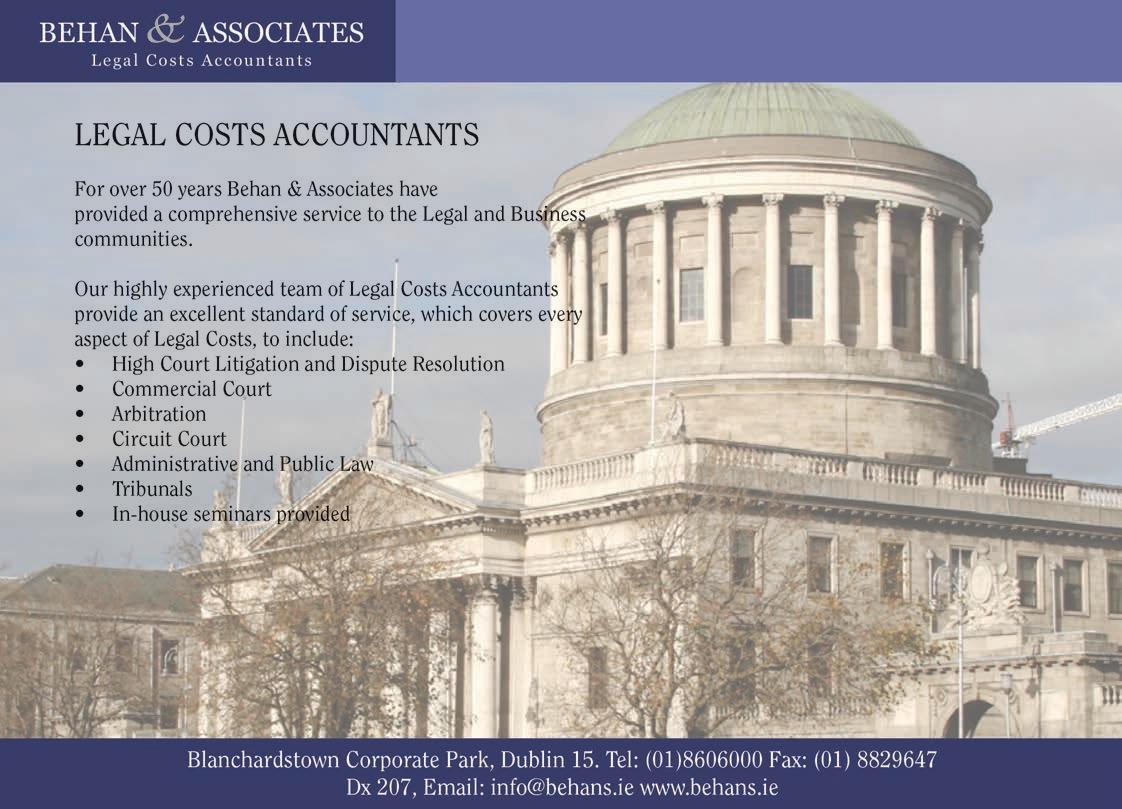



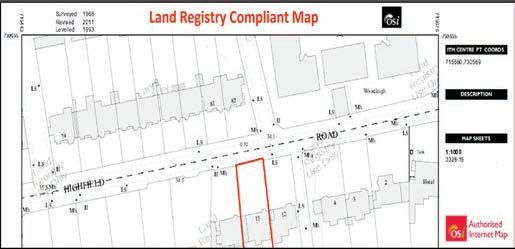
LAND REGISTRY MAPPING & BER CERTIFICATION SPECIALISTS l 650 Land Registration Maps produced yearly l 2,000 Commercial & Residential BER Certs issued annually l Qualified team of Architects & Engineers registered with SEAI & Engineers Ireland l Prompt Efficient Service l Full PI Insurance COMMERCIAL ENERGY RATINGS LTD Unit 3, Churchtown Business Park, Churchtown, Dublin 14. t: 01-2983000 e: info@cerl.ie www.cerl.ie l Land Registry Compliant Maps from €225+VAT
Drones and the Law
With drones now a frequent sight in the sky overhead, they pose many questions in respect of privacy and data protection. Oisín Tobin and Conor Califf look up and identify the issues


Most drones possess the ability to collect personal data. This often occurs, for instance, by the recording of their surroundings during flight through their onboard cameras. As
a result, it is important to consider what obligations the General Data Protection egulation GDP , may impose on your use of these new ish age flying gadgets.
What are Drones?
Drones, also known as Unmanned Aerial Systems or Unmanned Aerial Vehicles to give them their full technical titles, are becoming increasingly prevalent in our everyday lives, both in commercial and recreational contexts. Indeed, in an age of increased online commerce, some businesses in Ireland are planning long term to add the use of drones to the ways they deliver goods to customers.
While originally developed for military missions, with recent improvements in technology and the lowering of costs, drones have now been widely rolled out in the civil sphere for uses such as search and rescue operations, sports analytics and the delivery of goods. There is also now a thriving market in the sale of drones for personal use, with individuals using smaller drones for activity like aerial photography and exploration.
With the vast majority of drones having often very advanced camera systems however, a drone can effectively be used as a mobile surveillance system. Consequently, in the course of using one, it is highly possible that you will capture the personal data of others in a manner which could trigger the application of the GDPR.
We consider some of the potential data protection issues posed by drones and the Data Protection Commission’s recent Guidance on the use of Drones Guidance .
Will you be Considered a Data Controller by Using your Drone?
Under the GDPR, you are considered to be a data controller if you determine “the purposes and means” of a particular data processing activity. In the context of drones, if your drone has an operational camera which can take recordings that allow you to identify someone in the recording, you are likely to be considered to be processing personal data, i.e. you are determining why and how the recordings of individuals take place. If you do qualify as a data controller, you will be obligated to comply with the suite of obligations imposed by the GDPR.
What Lawful Basis can you Rely on?
You must have a lawful basis in order to process personal data under GDPR, and data processing related to the recording of identifiable images by drones is no different. As the DPC notes in its Guidance, different lawful bases will be appropriate in different circumstances. In more private settings where you know the data subjects that you are recording, asking for the data subject’s consent may be appropriate. The DPC uses the example of using drones to record practice sessions of team sports.
However, if your drones are used to carry out recordings in a more public setting, it is unlikely that you will be able to obtain consent for all individuals that you will record. Similarly, it is unlikely that you are in a contractual relationship with the recorded individuals. Therefore, legitimate interests is likely to be the more appropriate legal basis on which to rely.
What Transparency must you Provide?
When you process data under GDPR, you must provide data subjects with adequate transparency about your processing in line with Articles - GDP , as applicable. oting how difficult this may be in practice, the DPC advises in its Guidance that controllers take a layered approach as appropriate to the situation. Some
6 the Parchment
Privacy & Data
measures which the DPC highlights and which you may wish to consider implementing include:
•Having appropriate signage outside any venues or areas which you record similar to CCT warnings
•Signalling that the drone is recording by ensuring there are flashing lights/sounds in place on the drone
• Identifying yourself as a drone operator by wearing highly visible clothing
You should also incorporate information about the processing purposes carried out by your drones on your online privacy policy for example, if you use drones for surveying, this purpose should be added to your privacy policy and make this available to data sub ects on request.
What Other Data Protection Principles
Should be Considered?
Some of the other core data protection principles you should consider when recording via drones include:
• Data Minimisation: Only collect the minimum amount of data necessary for the processing purpose in question. One privacy protective measure which can be considered for this principle is the use of facial blurring technology, if available to you.
• Storage Limitation: Recordings collected by the drone should only be retained for as long as is necessary to carry out the applicable purpose. Information about how long drone footage or images will be retained for should be added to your data retention policies.
• Accountability: Consider if you have complied with all of your accountability obligations in relation to drone related processing. For example, you should consider if a Data Protection Impact Assessment is needed for example, could you be recording vulnerable data sub ects and you should consider if your records of processing activities need to be updated to account for drone related processing.
Do any Exemptions apply to the Application of the GDPR?
The GDPR has an exemption known as the “household exemption” which excludes the application of the GDPR to purely personal or household activities which have no connection to a professional or commercial activity. It is important to note that this exemption is generally applied restrictively.
In the drones context, the DPC’s Guidance advises that “recreational activity” like photography in a public place may qualify as a household or personal activity as long as your recordings are not made available to an “unrestricted audience”. However, the Guidance further counsels that if you use your drone for the purposes of surveillance over a vast area of land which can record surrounding private properties/public spaces, this processing may not qualify as a purely household activity and would be more akin to CCTV recording.
Even if your use of the drone does qualify under the above exemption, it is important that you still consider and comply with all applicable aviation law such as the Commission Implementing egulation of May on the rules and procedures for the operation of unmanned aircraft as well as applicable criminal laws like harassment laws and tort laws such as trespass .
Conclusion
The DPC’s Guidance is helpful for controllers to identify and comply with some of the GDPR’s most relevant obligations concerning drones. It signals that Ireland’s data protection regulator will be taking a greater interest in the use of this technology by controllers in the coming time period. As outlined in the Guidance, the DPC has already taken enforcement.
As a result, organisations and individuals will need to ensure that any processing of personal data carried out via drones takes place in full compliance of the GDPR.

the Parchment 7
Protection Autumn 2022 dsba.ie P
Oisín Tobin is a partner and Conor Califf is an associate in the Technology, Privacy and Data Security Teams at Mason Hayes & Curran
If your drone has an operational camera which can take recordings that allow you to identify someone in the recording, you are likely to be considered to be processing personal data
DSBA –Our Benefits



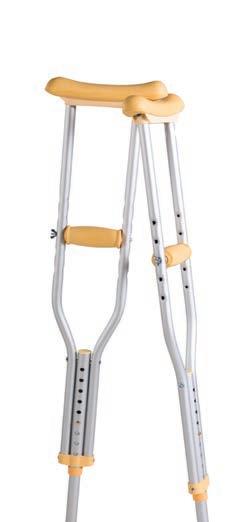
The Dublin Solicitors Bar Association DSBA is the largest bar association in Ireland, having been established in . It is a representational and not a regulatory organisation, existing to promote the welfare and interests of its members who are solicitors. The DSBA aims to promote a vibrant and up-to-date

profession and collegiality amongst solicitors. The DSBA offers the following benefits to members


































DSBA CPD Events – Preferential rates for members for top quality CPD Continuing Professional Development events held all year round. The DSBA is committed to providing a series of
conferences and seminars in the next months to meet the ongoing educational and information needs of its members.


DSBA Precedents – Precedent publications area available on topics including solicitors’ partnerships, residential tenancies, share purchase and sale agreements and family law and separation agreements. All these are in constant and daily use by practitioners.





8 the Parchment MEMBERSHIP
Parchmentthe DUBLIN SOLICITORS BAR ASSOCIATION MAGAZINE DSBA.IE Three leading practitioners give their view THE FUTURE OF PERSONAL INJURY LITIGATION? JUDICIAL REVIEW REFORM? 100TH ANNIVERSARY OF 1921 ANGLO IRISH TREATY THE BIRTH CERTIFICATE OF IRISH DEMOCRACY? WINTER 2021 ISSUE 90 Parchmentthe DUBLIN SOLICITORS BAR ASSOCIATION MAGAZINE All bark but no bite? RIGHT TO REQUEST REMOTE WORKING NEW DEFAMATIONLAW COULD SERIOUSCAUSE HARM CURRENT TRENDSIN FAMILY LAW SPRING 2022 ISSUE 91 DSBA.IE Parchmentthe DUBLIN SOLICITORS BAR ASSOCIATION MAGAZINE SUMMER 2022 ISSUE 92 DSBA.IE Legislation afoot as law plays catch-up HARM ON INTERNET FACIAL TECHNOLOGYRECOGNITION Garda powers to be enhancedASSISTED (CAPACITY)DECISION-MAKING ACTNew regime for practitioners
DSBA Parchment Magazine – Our award winning quarterly magazine which will keep you up to date with the profession and practice.
DSBA Sports Events – Golf, tag rugby, soccer, cricket, tennis – events to promote collegiality and friendship amongst solicitors.
DSBA Social Events – vents for solicitors throughout the year and our not-to -be-missed annual conference.
DSBA Submissions - Our committees and council work hard to represent solicitors and their interests – current DSBA taskforce on the Legal Services egulation Act.
The Consult a Colleague Helpline is available to confidentially assist every member of the profession nationwide with any problem whether personal or professional free of charge. The volunteers on the panel who provide the service are all solicitors of considerable experience, www.consultacolleague.ie.
DSBA Younger Members’ Committee represents the interests, both professionally and socially, of the younger and most recently qualified members of our profession, from newly qualified up to five years P . The ounger Members’ Committee of the DSBA organises low cost CPD events, lectures and other events for young solicitors.
DSBA Management Tools such as - CO T – Computerised Ob ections and equisitions on Title.
DSBA Website – www.dsba.ie see our regularly updated website for information on all of the above.

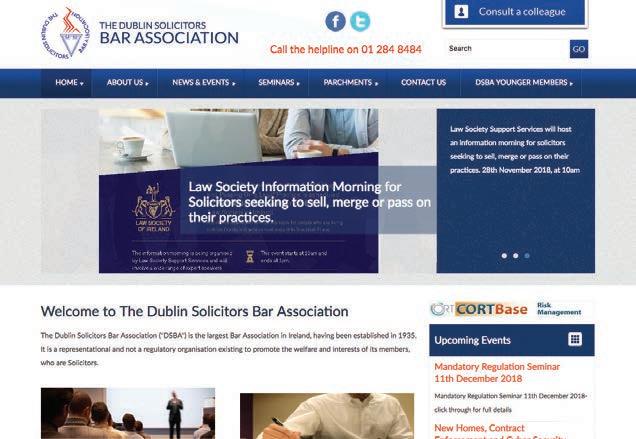
For renewal and new membership please complete the form below in full and return it together with a cheque bank draft postal order for the appropriate fee to Maura Smith, DSBA, nit , The Capel Building, Mary’s Abbey, Dublin . D Capel Building or call to pay by credit debit card.
GROUP MEMBERSHIP FEE 2022
One member € nd to th members € each th to th members € each th to th members € each st to th members € each st to th members € each st to p members € each plus members € each
Name:
Firm name:
Firm address:
Phone number:
Fax number:
number:
address:
Year admitted to the roll:
Enclosed please nd *cheque/bank draft/postal order for € for
new membership/renewal
the Parchment 9 Membership Autumn 2022 dsba.ie
✁
DX
Email
*
Latest edition of Solicitor’s Guide to Professional Conduct now available Online
The President of the High Court Mr. Justice David Barniville recently launched the th edition of the Solicitor’s Guide to Professional Conduct which is updated and renamed since the previous edition.
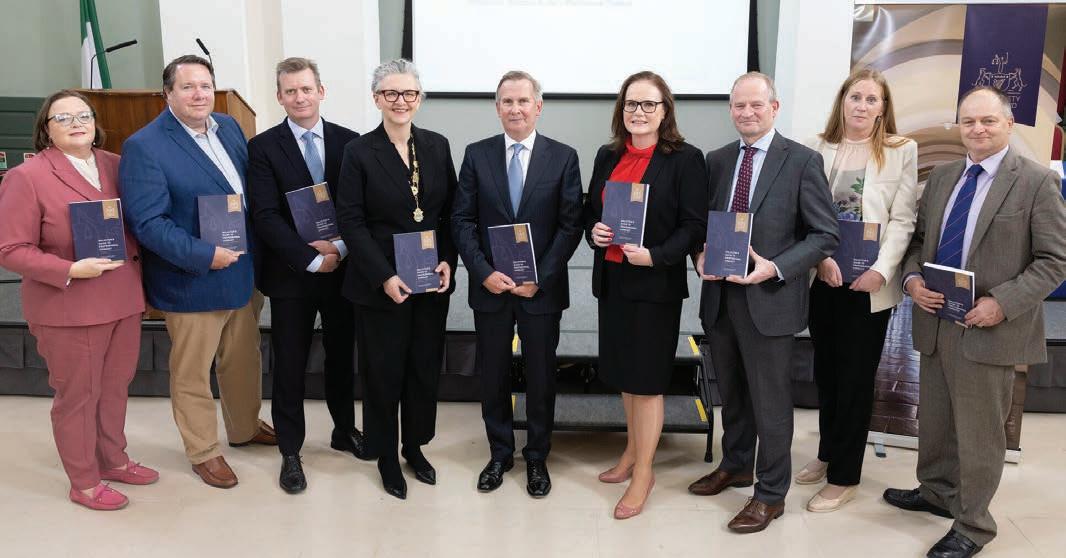

The previous edition was known as A Guide to Good Professional Conduct for Solicitors in Ireland rd edition and was published in . As Justine Carty, Chair of the Law Society’s Guidance and thics Committee points out in her introduction to the latest edition:
Ethics is personal to each solicitor, and it is for each solicitor to reach their own conclusion on ethical matters. For this reason, the Guide is neither a rule book nor a manual, and does not have the force of law. It is a source of reference on professional conduct for all solicitors, to be used as an information tool to assist solicitors in their decision-making and in considering the many and varied ethical questions that arise in day-to-day practice for every solicitor.
The Guide covers the rules of professional conduct, the solicitor and client relationship, conflict of
interest, privilege and confidentiality between solicitor and client, the solicitor and their relationship with the court, undertakings, the solicitor and their relationship with third parties and the LS A, the solicitor and their relationship with other solicitors, the solicitor and their relationship with counsel, the solicitor in practice, the remuneration of the solicitor and conduct in international practice. There are three appendices to the Guide: the Charter of Core Principles of the uropean Legal Profession and Code of Conduct for uropean Lawyers IBA International Principles on Conduct for the Legal Profession and the Family Law in Ireland Code of Practice . The Guide also has an excellent index which is of great assistance in using it.
Credit is due to all members of the Guidance thics Committee and Law Society staff who worked on updating the Guide.
The Guide is essential reading for all solicitors and can be accessed at https www.lawsociety.ie globalassets documents committees
10 the Parchment
conduct-guide.pdf P News
Keith Walsh is a Dublin solicitor practising primarily in the area of family law and family disputes. He is a quali ed mediator and collaborative lawyer
Susan Martin, Robert Baker, Mark Garrett – Director General of the Law Society; Michele Ni Longain – President of the Law Society, Mr. Justice Barniville –President of the High Court, Justine Carty, Brendan Dillon, Pamela Connolly – Secretary to the Guidance & Ethics committee and Augustus Cullen
Medical Negligence Litigation, 2nd edition
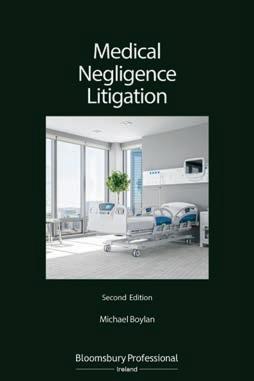 By Michael Boylan
By Michael Boylan
Pub Date: Sept 2022
Paperback Price: €195
€172.16
Available Now Coming Soon
This new edition* has been updated to account for all relevant cases and legislation since 2016 including Morrissey v HSE, AC v HSE and Dr B, and Personal Injuries Assessment Board (Amendment) Act 2019. It also includes two new chapters on National Screening Programmes and Public Health Policy and Defective Product Cases and Class Actions/Multi Part Cases-Multi-Party Actions.
available as part of Bloomsbury Professional’s Irish Medical Law Online Service
called A Practical Guide
Disciplinary Procedures in the Statutory Professions

 By Simon Mills, Aideen Ryan, Colm Scott-Byrne
By Simon Mills, Aideen Ryan, Colm Scott-Byrne
Pub Date: Oct 2022
Paperback Price: €225
€198.65
9781526508522
Various disciplinary and regulatory bodies have different rules, powers and procedures, even while sharing a basic legal framework. This book allows a legal practitioner who is appearing before such a body to prepare their case by setting out what powers the body has, what evidence it can hear, the form the procedure will take, whether they can call witnesses, and what sanctions it can impose.
available as part of Bloomsbury Professional’s Irish Employment Law Online Service
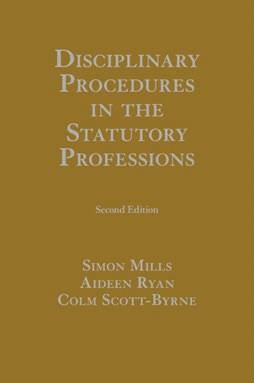
Order your copies now on BloomsburyProfessional.com or email us at bpireland@bloomsbury.com
Also
*formerly
to Medical Negligence Litigation
Also
eBook:
ISBN: 9781526521743
eBook:
ISBN:
info@erinresearch.ie +353412133000 www.erinresearch.ie Locating missing beneficiaries & next-of-kin Join our FREE CPD webinars Family Tree Checks Tracing Administrators S.49 Applications Probate Property Services Missing Wills INTERNATIONAL PROBATE GENEALOGISTS

12 the Parchment
Leading the Way
Keith Walsh meets new Director General of the Law Society Mark Garrett for an in-depth discussion on his plans and the challenges ahead for the solicitor’s profession
In early 2008 Mark Garrett was working for McKinsey in ew ork and living in Greenwich illage. e had worked his way up in the public policy field via CD and DIT and a stint with Bill O’ erlihy. e had also worked in the establishment of the Digital ub and then the Competition Authority and he now found himself with McKinsey Company, the world’s leading management consultants. It was a dream role – he managed McKinsey’s relationships with local, state and federal government, he travelled to all the main cities in north America and he loved his ob. Both he and his wife had applied for green cards, as he says we were living our best New York life”.
Then the leader of the Labour Party, amon Gilmore, came calling – would you come home to be my chief advisor Complete dilemma says Mark. After a lot of agonising he and his wife returned home and he took up the role. We all know what happened next and following a very good election for Labour, Mark found himself as Chief of Staff to the T naiste working with the Chief of Staff to the Taoiseach, as close
to the heart of government as it was possible to be from - . Mark was named by the Irish Times in as one of the people who ran Ireland. e could also be one of the people credited with saving Ireland in that period. The Irish Independent in called him highly respected and a central figure in Labour’s record success in the election.
Following a disappointing showing for Labour, Gilmore was replaced as party leader and Mark was looking for another role. When I put it to him that it must be a shock to be in government one day and out the next, he ust says that’s politics and it was always going to end, most likely at an election. Finishing up with Gilmore was not the biggest thing that happened as the second of his two children was born on the same day. Gilmore quotes Mark Garrett, in his memoir – it’s very hard to be popular when you are doing unpopular things and while he might have some regrets, he is hugely proud of that period and believes they left the country in a much better place in . After what must have been an exhausting few years with Gilmore and Labour, and with a new baby at home, he was shattered and took six months off, then oined Glanbia as
Cross Examination
Keith Walsh is a Dublin solicitor practising primarily in the area of family law and family disputes. He is a quali ed mediator and collaborative lawyer. He is a former Editor of the Parchment and former President of the DSBA
It’s very hard to be popular when you are doing unpopular things
Autumn 2022 dsba.ie the Parchment 13
If you are pursuing something purely of interest to the legal profession, you will find it difficult to achieve
Director of Corporate Affairs and Public Policy before becoming Managing Director at Teneo in . Covid arrived and in Ken Murphy retired and the Law Society advertised for a new Director General. After an incredibly rigorous recruitment process, in September , he got another call, this time from Sligo’s Michelle O’Boyle head of the selection committee, to tell him he had been appointed Director General of the Law Society, starting in January .
And here we are, nine months later, in his office. The Parchment had offered to bring Mark out for lunch but it was not to be, as he makes it clear he would prefer a sandwich at his desk. Instead we opt for a morning mug of coffee in the Blackhall Place student canteen which Mark kindly pays for and we return to his spartan office. There is no wall of fame, no display of the photos which
must exist of his glory days in government in Ireland or with the various influential and well known figures in business and politics that he has encountered in the past years. We are in a functional room with a desk and a meeting table and no accoutrements of grandeur.
I soon understand why – Mark Garrett is not overly interested in money, status or the trappings of power. e is very interested in the use of political power in the state and the influence of the private sector on government policy. e doesn’t mess around and he talks in terms of public policy but is also really interested in the art of the possible – getting things done. e says if you want to make an impact on public policy or effect change you have to be aware of three things:

.What is the public interest in what you are
trying to do and why
.Is what you are trying to achieve in the profession’s interest
.Is it a government priority
Mark tells me If you are pursuing something purely of interest to the legal profession, you will find it difficult to achieve. The sweet spot is to get something with all three elements for example the long awaited reforms in conveyancing. The conveyancing committee has done huge work on this, it is definitely in the public interest and housing is a huge government priority, they can see that the reforms are in everyone’s interest. While you could be in the media talking about legal costs every day, this is not an argument you can win in public. The Law Society can make the case for the profession but it is better for others to make the argument. Mark believes it is better to build allies. Another example he gives is legal aid, it is in the profession’s interest to increase the budget for legal aid but it is also in the public interest that public ustice works and moves smoothly. The point is best made from the public interest point of view. There is little point
14 the Parchment
in highlighting that it is in the interest of legal profession. When Mark looks at a public policy challenge, he asks – who are our allies, if we do it alone, we are unlikely to win. From the other side, having worked in government, the government will listen to those who act in the public interest and where it is a government priority. e notes Government will look behind you and ask who is with you, when we have an important issue, we ask who are our allies, if we have none, we have to ask why.

So how is he getting on nine months after becoming Director General e is really en oying the role... a great organisation, great profession, real impact in society and that is what the challenge is, to harness those opportunities while understanding that the profession has significant challenges . e has spent quite a bit of time recruiting the new senior management team and this week is the first time we have a full complement of directors.
Dr. iall Connors is the new Director of egulation, Gillian Cregan is the new Director of Finance and Operations, and Dr. Geoffrey Shannon SC is the new Director of Policy and Public Affairs. xisting directors who make up the management team are Teri Kelly, Director of epresentation and Member Services, TP Kennedy, Director of ducation and Barbara Carroll, Director of uman esources.
Public policy is my background and so I wanted to get to know the organisation and the profession. I’ve really en oyed getting out to the Bar Associations and also meeting stakeholders whether it be the Bar Council, those in government, media, the LS A or others, to understand where the Law Society stands now and what are the challenges for the future.
e continues The era of big government will be with us for some time, this provides more laws, more disputes, this is an opportunity for the legal profession but we may also see more regulation of the profession which will be a challenge.
Opportunities for the profession arise from the huge international investment, international headquarters, seeing additional legal service demands .
Mark believes the law is seen as a way for people to make an impact on society and this attracts significant talent to the profession which is a real opportunity. The Law Society provides about , per year for its access programme which assists those from different backgrounds to train as a solicitor, who may otherwise not have been able to do so, due to socio economic pressures. Mark would like to see these programmes
Mark Garrett at a glance
BORN Ballina, County Mayo FAMILY DETAILS Married with two sons aged 8 and 11, lives in Dublin 6
FAVOURITE SPORTS? Mayo GAA supporter, coaches under 11 boys football, jogs and cycles to work MAIN SOCIAL ACTIVITY Taxi of mum and dad
GREATEST PASSION Enjoying his kids as much as possible, hugely involved in the GAA INTERESTS History, politics and ction. Major podcasts his main source of information, his favourites are New York Times
'The Daily', a 20 minute news summary, 'The Rest is History' podcast which is twice weekly on history and 'The Rest is Politics' with Alastair Campbell and Rory Stewart
replicated across the education sphere.
e also believes the public sector has a role to play in educating trainees. e points out that only two of the current intake of almost trainees in Blackhall Place are working in the public sector. The firms provide the training opportunities but he thinks this should be a much broader responsibility and the public sector has a role to play in that as well.
The recruitment and retention of talent is a significant issue in the law, but also in every other profession, there are changing demands in the workforce, independent
surveys show a diminishing number of solicitors would recommend the profession to family members, that has to be a concern and some of that is the pressure and the work environment. We need to think, pause and reflect on the Dignity Matters eport that was published last year – to the credit of the legal profession. We are examining what the issues are, studying and putting a programme in place to address some of those issues . The underlying message is not a positive one it needs to be addressed across the profession. This can be done by building awareness of unacceptable behaviour, by
Cross Examination
Photography: Bryan Meade
Autumn 2022 dsba.ie the Parchment 15
putting in place the recommendations of the eport and ensuring that the culture of organisations does not find this type of behaviour acceptable .
is view of the profession is that the old divide between small and large firms has changed, there is now a third pillar – the in-house sector which is both public and private. The law is not isolated from the rest of society, there is a significant demand for legal education, it is a career that is desirable, the educational offering will evolve, there is both demand for and opportunity for the Law Society to provide more legal education.
e notes that of the recent intake of PPC trainees are based in Dublin, -
years down the line what is the implication of this for the profession and for society Mark believes we need to start building awareness that this is a societal challenge and not ust a professional challenge, we’ve seen this with GPs in rural areas, if we are going to have services like the law, the impact on access to ustice – how far would you have to travel to talk to a solicitor. The Law Society is committed to dealing with this not ust in terms of what it can do but also talking to other professional bodies to see how we can support smaller practices to be sustainable in the longer term.”
As the membership of the Law Society is evolving, the Law Society services need to be tailored to meet the demands of the
big commercial firms, the smaller firms and in-house counsel. One example of an offering tailored to the bigger firms is the group Ireland For Law . Mark points out that in spite of the differences between the various firms and in-house counsel, there are many things that draw people together, there is commonality on the impact of the public interest element of the law.”

Mark says the profession and society want a well-resourced court and ustice system. ou can see it in terms of the number of udges needed, the need for improved court facilities, that legal aid is under pressure, and the difficulty faced by people trying to access the legal aid system. The ustice system needs better funding as delays are of concern for all involved. The Law Society needs to highlight this and to get better investment. Delays have a real life impact on people and families and it is in the interests of both the profession and broader society to solve these problems. We cannot have a modern society without a wellfunctioning ustice system.
After spending over two hours in his company, my impression of Mark Garrett is that he sees the legal profession not only as we see ourselves but – more importantly – also how others see us. This is not always a pretty picture. As a pragmatist, I am assuming, as he did not say it explicitly, that he will have no truck with self-serving nonsense from the profession, but that he can help the Law Society to make real changes where these changes are possible.
is expertise is in delivering real and much needed changes to the profession and to the ustice system because he understands to an unparalleled extent how to effect real change in government policy. e has inherited from his predecessors a Law Society in excellent shape, he now has his management team in place and he has the unique opportunity to shape the next seven years of the profession’s future.
ltimately the future is uncertain, the best way to predict the future is to shape it he says quoting Abraham Lincoln. An awful lot is happening around the Law Society and that will change the operating environment in which the profession works, so public policy will shape the regulation, the education of solicitors , the courts environment. Society demands transparency, it is all changing. If we want influence we must engage with the policy makers and those outside Blackhall Place. I want to use my public policy background to help influence the policy makers and to help guide the profession to understand how policy makers are thinking. Bottom line – I have not been hired for my legal advice.
P 16 the Parchment
The law is not isolated from the rest of society, there is a significant demand for legal education, it is a career that is desirable, the educational offering will evolve, there is both demand for and opportunity for the Law Society to provide more legal education








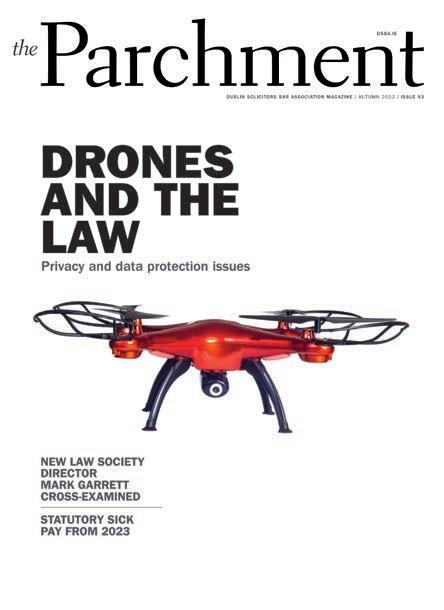

THE DUBLIN SOLICITORS BAR ASSOCIATION Dublin Solicitors Bar Association, Unit 206, The Capel Building, Mary’s Abbey, Dublin 7. Phone: 01 6706089 | FAX: 01 6706090 | DX: 200206 Capel Building. www.dsba.ie TO ADVERTISE CONTACT: SHARON HUGHES TEL: 086 871 9600 E: SHARON@256CONTENT.COM
Restrictive Covenants in Commercial Leases
Ciara Ryan reports on a recent High Court judgment which illustrates the need for all parties to a commercial lease to carefully consider and fully appreciate the scope and meaning of any restrictive covenant entered into by them

In the case of Dunnes Stores Unlimited Company v Dafora Unlimited Company I C , , the plaintiffs sought to enforce restrictive covenants in a commercial lease, which prevented the defendants from selling food, food products or groceries from a unit at a retail park. The defendants accepted that the restrictive covenants applied to their unit. The real dispute between the parties was whether or not the defendants had been in breach of the lease in selling items which should properly be regarded as groceries and whether or not the defendants were entitled to sell groceries which extended beyond food or food products .
The resolution of this issue ultimately involved five days of hearing before the High Court on liability alone, the tendering of extensive evidence as to what exactly was comprised in the term groceries and lengthy and complex legal submissions with the court ultimately unable to draw a final line under the matter.
Decision of the Court
In a lengthy udgment examining relevant case law and evidence, Sanfey J said that in deciding what came within the definition of groceries , the court must ascertain the meaning which the lease would convey to a reasonable person having all the background knowledge which would reasonably have been available to the parties in the situation in which they were at the time of the contract The reasonable person must have, or acquire, a sympathetic understanding of the commercial or practical context in which the agreement was meant to operate .
e said that there was no relevant definition in the lease nor was there a list of items or general categories appended to the lease which might comprise groceries .
e ultimately held that the term groceries included non-durable consumable household items
which are purchased frequently and agreed that a list of items cited by the plaintiffs ranging from cosmetics to kitchen towels came within the definition and that the defendants had breached the restrictive covenant.
owever, this was not the end of the matter. e said that it might well be possible to pick holes in this formulation, or to suggest that it did not cover every item which might or might not be groceries . evertheless, on this point, he expressed confidence that in relation to any remaining items in respect of which there is doubt as to whether or not they are groceries , the parties as substantial and responsible traders would be able to come to a business-like accommodation, rather than resorting to further legal action.
Finally, he looked to the past, saying that perceptions of what was comprised in the term groceries had changed over the years. This meant that in the future, items which had yet to be invented or which were not yet on the market could give rise to a bona fide dispute as to whether they are groceries for the purpose of the lease between the parties. He tailored his final order to take this eventuality into account.
Conclusion
While the High Court has given judgment on liability here, it is clear that this is not the end of the road for the parties. Giving the lack of precision around the term groceries and the fluidity of the term over time, as the court has recognised, there may be a need for ongoing dialogue between the parties over the long term and further disputes may arise. This gives rise to an undesirable level of uncertainty going forward and illustrates the need for clarity and precision at the outset when drafting restrictive covenants in a commercial lease.
This case is currently under appeal and the view of the Court of Appeal is awaited with interest.
18 the Parchment Landlord and Tenant
Ciara Ryan is a litigation partner at McCann Fitzgerald LLP specialising in property disputes and commercial landlord and tenant law
P

CONTACT DETAILS e: diplomateam@lawsociety.ie | t: 01 672 4802 | w: www.lawsociety.ie/diplomacentre | @LawSocIreland A lectures and workshops are webcast and available to view on playback, a owing participants to catch up on coursework at a time suitable to their own needs. Diploma Centre reserves the right to change the courses that may be o ered and course prices may be subject to change. BOOK NOW FOR AUTUMN 2022LAW SOCIETY DIPLOMA CENTRE POSTGRADUATE COURSES TO SUIT A BUSY SCHEDULE Leaders in legal education with professional focus and practical insight 23 September 2022€2,600 24 September 2022€3,200 29 September 2022€1,650 4 October 2022 €1,650 5 October 2022 €3,475 8 October 2022 €2,600 11 October 2022 €2,600 12 October 2022 €3,000 12 October 2022 €3,000 18 October 2022 €1,650 19 October 2022 €2,600 22 October 2022 €1,650 27 October 2022 €1,650 2 November 2022€1,650 3 November 2022€1,650 4 November 2022€2,600 15 November 2022€1,650 Diploma in Trust and Estate Planning Certi cate in Aviation Leasing and Finance Diploma in Mediator Training Diploma in Construction Law Diploma in Technology and IP Law Certi cate in Conveyancing Diploma in Sports Law Certi cate in Agribusiness and Food Law Certi cate in Criminology and Criminal Justice (NEW) Certi cate in Immigration Law and Practice Diploma in Judicial Skills and Decision-Making Diploma in Employment Law Diploma in Finance Law Certi cate in Pensions Law and Applied Trusteeship Diploma in Education Law Certi cate in Assisted Decision-Making Capacity COURSE NAME START DATE COURSE FEE Certi cate in Trade Mark Law
The Payment of Wages Amendment Tips and Gratuities Act, the Act became law on th July . Michelle yan examines the Act which she says will provide clarity on how voluntary tips and gratuities left for employees are to be treated and provides further protection for employees in relation to the payment of wages
Tips and Gratuities Introduction
The Act which requires a ministerial order to commence introduces new rules about how employers share tips, gratuities and service charges amongst employees. The new legislation makes it illegal for employers to use tips and gratuities to make up basic wages.
The key provisions of the Act require employers to:
•Not use tips to make up an employee’s basic wage and prohibits employers from deducting from an employee’s wage in respect of tips and gratuities made to an employee;
• Clearly display their policy on tips and gratuities for customers clarifying how they are distributed; and •Not use the term ‘service charge’ or similar unless the gratuity goes directly to staff.
Treatment of Tips and Gratuities
The Act makes provision for the circumstances where an employer performs the same work as staff. Where this occurs, the employer may keep a share of electronic tips, but no more than an amount that is fair and reasonable in the circumstances.
Where an employer fails to adhere to specific obligations under the Act, they are liable under summary conviction to a class C fine up to a maximum of , .

In light of the legislation, the hospitality industry should review policies in place to ensure that they are in compliance with the legislation including notices as required under the Act.
What is ‘Fair’ Distribution of Tips?
The Act sets out the process of deciding what is ‘fair’ distribution of tips and gratuities in the event of a dispute being referred under the Act to the Workplace elations Commission W C . In the event of a claim to the WRC, an Adjudication Officer shall have regard to all of the factors or circumstances relevant to the case, as well as the following exhaustive list:
•the seniority or experience of the employee; •the value of sales, income or revenue generated for the business by the employee; •the proportion or number of hours worked by the employee during the pay period in which the tip or gratuity was made; whether the employee is on a full-time or parttime contract of employment; the role and influence of the employee in providing service to customers; •whether the employee was consulted in relation to the manner of distribution; and •whether there is an agreement, whether formal or informal, between the employer and the employee providing for the manner in which tips or gratuities are to be distributed.
Tips and Gratuities Statement
An employer is also obliged under the Act to provide a statement to their employees which outlines the total amount of tips or gratuities distributed by the employer for the period to which the statement
20 the Parchment
relates, as well as the amount of tips and gratuities distributed to the employee to whom the statement is provided.
This statement has to be provided to the employees no later than days from the date on which distribution of tips and gratuities is made. The employer is also obliged when issuing these statements to take reasonable steps to ensure that the statement and its contents remain confidential and this confidentiality extends to the agents of the employer and other employees.
In addition to the added notice of the statement itself, the Act also implies that should any employer wish to change the way in which tips and gratuities or mandatory charges are distributed amongst staff, they must first consult employees. Where any statement is provided which contains an error or omission, the statement is still regarded as complying with provisions of the Act so long as it can be proven that this error or omission was a clerical mistake or otherwise made accidentally in good faith.
Mandatory Payments vs the ‘Service Charge’ and the Prohibition on Certain Deductions
The Act differentiates between mandatory payments and service charges. A mandatory payment is a payment that a customer is required to pay in order to receive certain goods or services, while a service charge is a payment voluntarily made to or left for an employee where the customer intended or assumed
that the payment would be kept for the employee.
The Act prohibits employers from making deductions from the tips or gratuities to be distributed to employees other than in cases where this deduction is required by law or to the extent that the deduction is fair and reasonable in order to meet costs directly arising from the paying of the tips and gratuities. This is broadly in line with Section of the Payment of Wages Act 1991 which made a similar prohibition in relation to the paying of wages to employees.
Notices on Display
One of the most talked about aspects of the new Act surrounds the ‘tips and gratuities notice’ which must now be displayed by employers in their premises. This notice must state:

•whether or not tips or gratuities are distributed amongst employees; •where tips and gratuities are so distributed to, the manner in which they are distributed and the amounts so distributed; and •whether mandatory charges or any portion of them, are distributed to employees and if so, the manner and amounts distributed.
Conclusion
In view of this new law, employers should scrutinise policies in place so that they are compliant with the legislation and in particular the displaying of notices which are now required.
the Parchment 21 Employment Law Autumn 2022 dsba.ie P
Michelle Ryan is a partner in the Employment team at RDJ
One of the most talked about aspects of the new Act surrounds the ‘tips and gratuities notice’ which must now be displayed by employers in their premises
Au Contraire!
A legal first – fictional character Del Boy is now protected by copyright says Gerard Kelly and Ciara Browne following a recent K decision


In a decision of the Intellectual Property nterprise Court in the K in June , it was found that the well-known fictional character of Del Boy Trotter from Only Fools and Horses is protected by copyright. This decision now allows the owners of that copyright to prevent others from making use of the character. Significantly, this is the first time a fictional character has been protected through copyright and will have a significant impact on the protection of literary characters and works going forward.
The defendants in this case ran an interactive dining show called the Only Fools The Cushty Dining xperience . Throughout the meal, the actors would play different characters from the Only Fools and Horses television series. While the dining experience did not use scripts from the T series, the actor playing Del Boy did portray some very iconic features of his character.
The Argument
The Claimant in this case, Shazam, was a company owned and controlled by the estate of the late author of the Only Fools and Horses scripts. Shazam claimed that the copyright in the character of Del Boy had been infringed by the portrayal of several identifiable features of Del Boy’s character. It was contended that these characteristics collectively made up his persona and would therefore be deemed protectable. These included his use of sales patter, his poor use of French and his eternal optimism, amongst others.
Factor Considered
The court firstly had to consider whether Del Boy’s character was original and secondly the court had to decide whether he could be protected as a literary or
dramatic work. In applying this two-stage test, the court found that Del Boy’s character was original and did constitute a work as the relevant features of the character were “precisely and objectively discernible in the scripts”. law was applied because the facts giving rise to the case arose in advance of Brexit.
Infringement?
The next matter for the court to consider was whether or not infringement had taken place. The defendants sought to rely on the defence of parody or pastiche in accordance with Section A of the Copyright, Designs and Patents Act . In Ireland, this defence falls under Section of the Copyright and elated ights Act , as amended. Both sections state that fair dealing with a work for the purposes of caricature, parody or pastiche does not infringe copyright in the work. Following a detailed consideration of the matter, the court held that mere imitation is not enough to constitute parody . The defence of pastiche was also re ected.
Conclusion
This case is an interesting one as it is the first time an nglish court has provided for protection of a fictional character. As the decision applied law, it will no doubt be of relevance to Irish courts in considering similar cases in the future. The decision is a welcome development for Ireland’s literary industry and its stakeholders who may now have another way of protecting the copyright in their characters specifically. These characters will need to be well developed and there may be arguments against protection for those characters who do not have traits as distinctive as Del Boy Trotter.

22 the Parchment Intellectual Property
Gerard Kelly is a partner at Mason Hayes and Curran and Head of the Intellectual Property team. Ciara Browne is an associate in the Intellectual Property Team at Mason Hayes and Curran
P



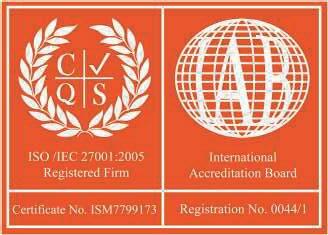
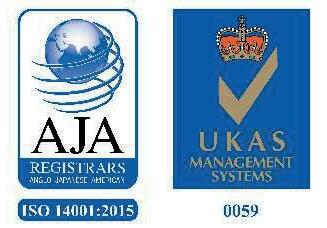


court books & virtual documents made easy 6 Jervis Street, Dublin 1 T: 01 872 5077 E: jervis @snap.ie snap.ie Books for Court • Digital Files for Online Cases Confidentiality Assured • Bulk Copying Full Confidentiality Agreement Available Binding • Printed Tabs • Ring Binders Secure Collection & Delivery Service Available We’ll bring order to the paperwork, so you can practise better law.
Just What the Doctor Ordered –Paid Sick Leave is now the Law
The Sick Leave Act was signed into law on the th July . It is expected to come into force on the st January . Catherine O’Flynn reviews the new legislation and notes that prior to its introduction, Ireland was one of the few uropean countries without a statutory mandatory employee sick pay scheme

While many employers have provided sick pay to their staff, this is not always the case for lower-salaried workers. All employees both full-time and part-time will have an entitlement to statutory sick leave and pay for situations where they would ordinarily work but are incapable of doing so due to illness or in ury.
The Sick Leave Act the Act provides for statutory sick leave payment SSP for an employee, subject to certain conditions, in respect of a day which they would ordinarily work but are incapable of doing so due to illness or in ury, of up to three statutory sick leave days a year. An employee is entitled to SSP from their employer in respect of each statutory sick leave day. Statutory sick leave days may be taken consecutively or non-consecutively. An employee will have to provide a medical certificate from a registered medical practitioner stating that they are unable to work. An employee does not become entitled to statutory sick leave days until they have completed weeks of continuous service with their employer. Once the entitlement to SSP from the employer ends, the employee may qualify for illness benefit from the State.
The Act will not apply to employers who provide more favourable sick leave/pay schemes to their employees. This will be determined by reference tothe period of service that is required before sick leave is payable; •the number of days that an employee is absent before sick leave is payable; •the period for which sick leave is payable;
•the amount of sick leave that is payable; •the reference period of the sick leave scheme.
SSP and Employer Exemptions
Employees shall be entitled to a daily rate of payment as prescribed under the Act in respect of statutory sick leave. nder the Act, SSP will be paid at of regular earnings up to per day. This rate can be varied by ministerial order in the future to align with inflation and changing incomes.
mployers who genuinely cannot afford to pay the SSP or who are experiencing financial difficulties can apply to the Labour Court for an exemption from paying SSP for a period of between three and months. The Labour Court requires an agreement between the employer and their employees consenting to the exemption sought. Failing this, the Labour Court may still grant an exemption if satisfied that the employer has informed its employees of its financial difficulties and attempted to reach an agreement, and that if the employer was compelled to pay SSP the viability of the business would be adversely affected, or likely lead to a material number of employees being laid-off or made redundant.
Future Amendments
Sub
ect to certain conditions, provided months has passed since the commencement of the Act, and at -month intervals after that, the relevant Minister is entitled to specify additional sick leave days under the Act having regard tothe state of the economy generally, the business environment and national competitiveness;
24 the Parchment
the state of society generally, the public interest and employee well-being the potential impact, including the potential for any disproportionate or other adverse impact, that the making of an order will have on the economy generally, specific sectors of the economy, employers or employees; annual and quarterly data on earnings and labour costs as published by the Central Statistics Office •expert opinion, research, national or international reports relating to the matters specified at paragraphs a to d that the Minister considers relevant; •the views of employer representative bodies and trade unions; and such other matters as the Minister considers relevant.
owever, the Minister cannot reduce the number of statutory sick leave days below three, or increase by more than three, the number of days accounted for in the previous Order.

The Department of nterprise, Trade and Employment has indicated plans to increase statutory sick leave days as follows ear days covered ear days covered ear days covered.
Employees on Probation
Where an employee is a on probation, b is undergoing training in relation to that employment or c is employed under a contract of apprenticeship and that employee takes statutory sick leave,
the employer may require that the probation, training or apprenticeship be suspended during the period of statutory sick leave. This applies in circumstances where the employer considers that the employee’s absence would not be consistent with the continuance of the probation, training or apprenticeship.
Compliance and Record Retention
Where an employee believes that his or her employer has failed to comply with the provisions of the Act, the employee may make a complaint to the WRC. An employee who makes such a complaint may be awarded up to four weeks’ remuneration if successful. mployers are required to keep a record of the statutory sick leave taken by each of their employees and this record must be retained by the employer for a period of four years. Failure to comply with this record-keeping requirement could result in a fine of up to , .
What Happens Next?
While signed into law, the provisions of the Act have yet to come into force. A statutory commencement order is necessary to bring the Act into practical operation. The implementation of this commencement order is expected later this year. mployers are advised to proceed with introducing a sick pay policy to mitigate risks and prepare for the commencement of the Act. Those employers with a sick pay policy already in place should undertake a review of their employee handbooks and contracts to ensure that they align with the Act.
the Parchment 25 Employment Law Autumn 2022 dsba.ie P
Employers are required to keep a record of the statutory sick leave taken by each of their employees and this record must be retained by the employer for a period of four years
Catherine O’Flynn is a partner and Head of the Employment and Bene ts Department at William Fry
Litigation
Are you a Member of a Club?
The igh Court in the case of Brady v Moore and Scanlon I C recently handed down a decision, which is of interest to anyone who is involved in the running of their local sporting or social clubs. Neil Cahill assesses the case and its implications


Facts
The Defendants in this case were representatives of a GAA club in Meath. The Plaintiff was a member of said club who, when working as a volunteer, fell from the roof of the clubhouse and sustained serious in uries. The plaintiff was seeking damages for these in uries.
The Arguments
The Plaintiff argued that he was on the premises as a visitor and that under the provisions of the Occupier’s Liability Act, 1995 the club owed him a duty of care.
The Act defines a visitor as an entrant, other than a recreational user who is present at the invitation or with the permission of the occupier, or by virtue of a contractual term or who is present as of right.
The plaintiff’s argument was predicated on the assertion that the premises on which he was in ured was in the occupation of the club.
The defendants did not call any witnesses in their defence. They argued the club was owned by its members, and as a member, the Plaintiff was along
with the other members the occupier. In effect, they argued the Plaintiff could not sue himself.
The Decision
The Court viewed the issue holistically and attempted to determine whether there was any element of the accident, which would have distinguished the Plaintiff from the membership. It was argued, without success, that the organiser of the voluntary work the second named defendant could have been said to have held a leadership role during the work that would have attracted liability. In re ecting this possibility Stack J emphasised the importance of the Plaintiff exercising his own free will and udgement in agreeing to assist the club. Accordingly, the Court dismissed the claim.
Conclusion
This case restated the law that in a club environment the legal entity of the club was its members and, as such, it was impossible to sue yourself.
It is a welcome decision as the effect of a member being able to recover damages in this situation could dissuade volunteers from helping out their local club and have a damaging effect on the population at large.
26 the Parchment
P
Neil Cahill is a senior associate in the Litigation and Dispute Resolution Team at Fieldfisher

Reach the two required national newspapers for your legal notices Same day publication, same contact, one payment Starting from €140 + VAT per newspaper €270 + VAT for both Call for an instant quote and hassle-free booking 01 4993414 or email: legal@thestar.ie Mirror lmHMRY now part of the same publishing group Y OUR LEG AL COST S PAR TNE R McCannSa dl ier , Lega l Cos tsA ccoun t ant s ha s ov er 1 00 years ofcombi n ed l ega l co s ts e xperie n ce. We ar e a r esul ts drive n t eam of le ga l co sts practiti on er s suppo rt ed by sp ec ial is ed sta ff. Ce ntral to our p r ac ti cei s t he sw ift at ten t io n to the pr ep arat io n ofbil ls ofco st s for a djud i ca t ion oppo si ngbi lls or ge nera l adv i ce s, in ev er y ar ea o flit ig at io n a nd non -c onte nt iou s bu siness. All of ou r p ractiti on ers ar e membe rs of th e Inst it ute of L eg alC os t s A ccoun tan ts . T 01 84 07 069 E INFO@McCAN NS ADLIER. IE W McCANN SA DL I ER. IE SWORD S: 11 NOR TH ST REE T BUSINE SS PAR K, SWORD S, D UBLI N, K67 XH29. DX 9101 0 BLACK ROC K: 12 PR IOR Y O FFICE PARK, STILLO RG AN ROAD, BLACK R OCK , D UBLIN, A 9 4 N2V 3. DX 7003 t s d y s p n bi e r o n s t AN McCA P CK m a t n e C oun t a 67 XH29. UBLI
Residential Tenancies Law Update


Jeremy Erwin and John Deignan review two recent pieces of legislation that have been the sub ect of significant and current public debate in light of the scarcity of rental properties now available
Two pieces of legislation which deal with, among other things, termination of tenancies recently came into effect and landlords and tenants should be aware of these key changes.
Residential Tenancies (Amendment) Act 2021 (the “2021 Act”)
On the 11th June 2022, the relevant sections of the 2021 Act dealing with security of tenure came into effect, giving rise to a number of significant changes. In summary, those changes are the phasing out of a landlord’s right to terminate a ‘Part 4’ tenancy without reason on its expiry and transitioning to tenancies of unlimited duration. Below, we discuss the impact of these changes on existing and future tenancies.
Background
nder the esidential Tenancies Act as amended the Principal Act’ , a Part tenancy comes into operation after a tenancy has been in existence for a period of six months and the tenant has not been served with a valid notice of termination. A Part 4 tenancy arises automatically. Its creation grants significant rights to the tenant, principally, the right of
the tenant to remain in the dwelling for a further five and a half years. During that period, the landlord may only terminate the tenancy on the limited grounds laid out in section 34 of the Principal Act, namely:
1.The tenant has failed to comply with any of his or her obligations under the lease;
2.The dwelling is no longer suitable to the accommodation needs of the tenant;
3.The landlord intends, within nine months after the termination of the tenancy to enter into an enforceable agreement to sell the dwelling;
4.The landlord requires the dwelling for his or her own occupation or for occupation by a member of his or her family;
5. The landlord intends to substantially refurbish or renovate the dwelling or the property containing the dwelling in a way which requires the dwelling to be vacated for that purpose; and
6.The landlord intends to change the use of the dwelling.
However, under the old Part 4 tenancy regime, a landlord had the right to terminate a Part 4 tenancy upon the expiry of the six-year period i.e. at the conclusion of the Part tenancy , on notice to the tenant but without reason.
28 the Parchment
New Regime for Part 4 Tenancies
The 2021 Act changes the rules governing Part 4 tenancies to give tenants greater security of tenure. All new residential tenancies created on or after 11 June 2022 are tenancies of unlimited duration once the tenancy has lasted more than six months and provided a valid notice of termination has not been served on the tenant. This removes the right which was previously available to a landlord to terminate without reason upon the expiry of a Part 4 tenancy. Landlords remain entitled to terminate a tenancy on the specific grounds laid out in section of the Principal Act.
Not only do the new measures apply to tenancies created on or after 11 June 2022, they also apply to tenancies which are renewed after that date. Where an existing Part 4 tenancy expires on or after 11 June 2022 and a valid notice of termination has not been served then, upon its expiry, a tenancy of unlimited duration will be created.

For Part 4 tenancies created before 11 June 2022, the old Part 4 regime still applies, and a landlord still has the right to terminate a tenancy after 6 years without the requirement to give reasons.
For pre- June tenancies, a landlord may opt-
in at any stage to the new regime under section of the 2021 Act.
Comment
The 2021 Act clearly provides more security of tenure to tenants and over time tenancies of unlimited duration will become the norm. However, in the case of pre- June tenancies, landlords retain their right to terminate a Part 4 tenancy without reason on the expiry of the -year period notwithstanding that this right will cease to exist over time.
Regulation of Providers of Building Works and Miscellaneous Provisions Act 2022 (the “2022 Act”)
With effect from the th July , the Act introduces a number of amendments relating to, among other things, notice periods and service of notices of termination. Below, we summarise these amendments.
Notice Periods
The following notice periods have been introduced in relation to termination of a tenancy by a landlord:
•For tenancies of less than 6 months’ duration, the
All new residential tenancies created on or after 11 June 2022 are tenancies of unlimited duration once the tenancy has lasted more than six months
the Parchment 29 Landlord & Tenant Law Autumn 2022 dsba.ie
Jeremy Erwin is a partner and John Deignan is an associate in the Commercial and Business team at Hayes Solicitors
It is important to note that these new notice periods do not apply where a notice of termination is served for a breach of tenant obligations or rent arrears
applicable notice period is now days increased from days
•For tenancies between 6 months and less than one year in duration, the applicable notice period is now days increased from days
•For tenancies between 1 year and less than 7 years in duration, the applicable notice period is now 180 days. Previously, the notice period for tenancies of between 1 year and less than 3 years was 120 days. This amendment brings about one
fixed notice period of days for tenancies between 1 and 7 years in duration. 180 days was already the notice period for tenancies between 3 years and less than 7 years in duration.
•The notice periods for tenancies of longer durations than those referred to above remain unchanged.
The revised notice periods referred to above apply to termination of tenancies generally with effect from 6 July 2022. However, it is important to note that these new notice periods do not apply where a notice of termination is served for a breach of tenant obligations or rent arrears.

Notices of Termination
The 2022 Act imposes further obligations on Landlords in relation to the termination of a residential tenancy. A landlord is now required to serve a copy of any notice of termination on the esidential Tenancies Board TB on the same day that it is served on the tenant. This is the case regardless of the grounds for terminating a tenancy and failure to adhere to this requirement will render the notice of termination null and void.
Rent Arrears and Miscellaneous Issues
The changes outlined above in respect of service of notices of termination follow on from similar provisions which were previously enacted in relation
to termination of tenancies for non-payment of rent. In summary, such terminations are governed by the Residential Tenancies and Valuation Act 2020. There are similarities between the two different termination procedures and in the case of non-payment of rent, the following procedures apply:
.A landlord must first serve a -day warning letter in relation to rent arrears and a copy of that letter must be sent to the RTB at the same time as it is served on the tenant;
2.A landlord must then serve a notice of termination and a copy of that notice must be sent to the RTB on the same day as it served on the tenant; 3.Failure to submit copies of the rent arrears notice or the notice of termination to the RTB within the strict timeframes required will render the notice of termination invalid.
Separately, with effect from April , a landlord must register each tenancy with the RTB on an annual basis and pay an annual registration fee for each tenancy. The failure to do so can lead to a fine being imposed on the landlord by the RTB. This change has been introduced pursuant to sections - of the esidential Tenancies Amendment Act 2019. That Act was passed into law in May 2019 however the provisions dealing with annual registration of tenancies only came into operation on 4 April 2022.
Conclusion
The changes referred to above highlight the increasing protection for tenants which has come into operation recently. There is also an expanded role for the Residential Tenancies Board in processing the annual registration of all residential tenancies and notices of termination. For landlords, it emphasises the need to ensure all the statutory requirements are complied with if a residential tenancy is to be terminated for whatever reason.
P
30 the Parchment
Landlord & Tenant Law
What we cover








We provide a range of cover against legal title or ownership challenges, including, but not limited to; Market leading title insurance solutions to facilitate your transactions
Why DUAL Asset? DUAL Underwriting Ireland DAC trading as DUAL Asset is regulated by the Central Bank of Ireland. Registered in Ireland No.633531. Registered office: 98 St Stephen’s Green, Dublin 2 D02 V324 Helping you do more All risks/title wrapper Loan portfolios The security of knowing that we have one of the largest capacities in the asset underwriting market with ‘A’ rated insurers We are part of the DUAL Group, the world’s largest international underwriting agency Our underwriting flexibility and bespoke policy wordings to suit client needs Our experienced team brings a wealth of industry, legal and local knowledge. Here are just three reasons why our clients value our services: Contact our specialist underwriters today to find out how DUAL Asset can assist in your deals. pmcgennis@dualgroup.com 086 243 8279 Sarah Gateaud-Manase Underwriter EU www.dualasset.com Commercial and residential specific title risks e.g. Missing deeds, adverse possession, third party challenges Title to shares Right to light Renewable projects Probate Aviation sgateaud@dualgroup.com 086 821 0404 Paul McGennis Head of DUAL Asset Ireland Carla Smyth Commercial Underwriter EU carla.smyt h@dualgroup.com 086 417 3249 dualassetireland@dualgroup.com
Food for Thought
Maree Gallagher is a solicitor working Of Counsel with Covington & Burling LLP who was recently appointed as President of the BritishIrish Chamber of Commerce. She advises clients on EU food and life sciences law and policy. She is regarded as one of Europe’s leading crisis management experts and has extensive experience advising Fast Moving Consumer Goods FMCG companies on product recall and reputation management across the EU. She has over 20 years’ experience working with companies to bring their products to market. Her devotion to Mayo is as passionate as that of her interviewer, a fellow green and red devotee, Julie Doyle
Hi Maree, congratulations on your recent appointment as the first female President of the British-Irish Chamber of Commerce. At the Parchment, we are always intrigued to find out more about the trailblazers in our profession! Can you tell our readers a little bit about your background and where you grew up?
I am a Mayo person who happened to be born in Dublin! Both my parents are from Mayo, my Dad from Charlestown and my Mum from Swinford so my sisters and I grew up dividing our time between Dublin and Mayo. We went to school in Dublin and then basically did all the fun things in Mayo. We spent long weekends and school holidays in the West and loved every minute of it. As any Dublin based GAA fan knows, the litmus test of where you are really from is which team do you support when Dublin is playing? Anyone who knows us, knows that it is always the green and red of Mayo. Perhaps that’s what makes me an eternal optimist?! I am the eldest of three girls and we were very lucky at home to have an inspirational and very accomplished Mum. She was a nurse but also a very talented seamstress, a terrific golfer, a wonderful cook. In between all of that and ferrying us around, she was very involved with the O’Dwyer Cheshire Home charity and was a committed member and former Chairperson of the Mayo Association Dublin. We were brought up to believe that we could be whatever we
wanted to be provided we worked at it and that was a very valuable early life lesson.
Where did you go to college and what prompted you to follow a career in law?
I went to college in UCD where I studied History and Politics. It was then a throw up between law and PR and I decided to follow in my dad’s footsteps and study law. My mum left Swinford after her leaving cert to train as a nurse in Jervis Street in Dublin and my dad quickly followed to join An Garda Síochána where he went on to become a Detective Sergeant. He studied law at night and was called to the Bar when I was aged four. I remember seeing him in his wig and gown and being fascinated by the whole thing and the majesty of the Four Courts and the Round Hall.
He used to ask me to read briefs to him as he drove us to school, and we would then discuss how the cases went over dinner that evening so I suppose I grew up around the law and my dad was definitely my inspiration.
Where did you carry out your apprenticeship?
I was originally apprenticed to Michael P. Walsh, now Judge Michael Walsh, at Walsh Warren in Dublin but towards the end of my Professional Course at the Law Society I was very fortunate to be offered a place as a Stagiere with the European Commission in
32 the Parchment

the Parchment 33 Interview Autumn 2022 dsba.ie
Julie Doyle is a solicitor at West Lex Solicitors. She is member of the Parchment editorial committee
Girls and boys need to see women in leadership roles, and I have pushed myself to sometimes step out of my comfort zone to take on roles such as the Presidency of the British-Irish Chamber and Chair of the St. Patrick’s Festival because otherwise I am just a hurler on the ditch
Brussels. I spent six months working in the Equal Opportunities Unit at what was then DG5, and I fell in love with Brussels and European law. I transferred my apprenticeship to an Irish solicitor working in Brussels and I went on to qualify in 1995. However, I still have fond memories of the early days of my apprenticeship running up and down the quays to lodge papers and attend counsel.
You are renowned as the leading expert in Food and Life Sciences law and policy. How did this specialism come about?
In the same way as many things happen in life – by complete fluke! I was working in the Brussels office of a S law firm, and I was the newly qualified lawyer. We had a significant number of global food and drink clients and one of our biggest clients was in the gelatine industry. Suddenly, all the talk in UK and EU was about this thing called BSE and mad cow disease and our clients were frantically trying to understand what it meant and to engage with the policy makers to understand the impact of emergency measures and of proposed new food and feed safety rules to protect human health. As the most junior member of the team, I was tasked with following this emerging risk and before I knew it, I was submerged in the world of food, feed and life sciences regulation. It is a fascinating area of work though and I en oy the different challenges that it brings on a day-to-day basis, particularly the crisis management and incident response work – that is particularly rewarding.
You are also recognised as one of Europe's leading crisis management experts. Can you tell us a little about some of the high-profile crises you have been involved with in your career?
The earliest crisis I was involved in was, as I mentioned, the BSE crisis. There were so many implications of the emergency measures that were put in place at the time and the whole body of food and feed law was overhauled in the aftermath of that by the then Commissioner for Health and Consumer Safety, another Irish lawyer and former Attorney General, David Byrne. It was a really great time to be at the coalface in Brussels and to have some amazing global clients. It was hard work but was immensely rewarding and an excellent learning experience for a young lawyer.
Another memorable crisis is a case I call the “pigs on the pill” case. Essentially wastewater from the manufacture of the human contraceptive pill ended up getting into the food and animal feed chain in Belgium and the Netherlands resulting in sows being unable to conceive. The knock-on effect of the contamination was extraordinary and resulted in a pig cull in the Netherlands, numerous food recalls across urope and several significant lawsuits. It was all encompassing for a very long time.
Then of course there was the dioxin crisis which affected pork in Ireland ust two weeks before Christmas. I remember being at a crisis briefing in the Department of Agriculture on a cold weekend morning learning that virtually all the bacon and ham products on the shelves across Ireland had to be
recalled. I was getting calls and texts from friends and family asking if they could still have their weekend fry!
orsemeat was a very high-profile food incident in Ireland and across Europe and one of the interesting things in managing these crises is that how you deal with it very much depends on who your client is and what their priority is. Often it is to manage the reputational risk while also protecting consumers – that can be a very fine balance. Other clients are concerned about their liability and about potential litigation.
The Covid pandemic threw up many different issues for clients – at Covington we have a large pharmaceutical law practice and so we were busier than ever guiding clients through all kinds of issues from being essential workers to getting emergency use approval for vaccines and Covid testing methods. The first few months of the pandemic we were literally putting out one fire and then moving on to the next but thankfully we have great teams around the world. We all work very collaboratively together which is a real help in times of global crises.
Of course, some of the most interesting issues are the ones that nobody knows about like the very well known wine producer who contacted me in a panic because they had shipped wine to Ireland which, it turned out, was just water. When I asked if they had received any consumer complaints, they said no so we decided it was best to leave well enough alone!
You have a busy time ahead with your recent appointment as President of the British-Irish Chamber of Commerce. Can you describe for our readers the objective of the organisation and the role it plays for business and trade?
The British-Irish Chamber of Commerce is a private sector trade organisation, founded in 2011 to represent businesses and employers with interests in the two islands of Great Britain and Ireland. The Chamber’s mission is to highlight, protect and grow the trade between Ireland, Northern Ireland, Scotland, Wales and England. That trade is worth over €1.6 billion a week or over €90 billion a year and supports 600,000 jobs across the two islands.
Chamber policy is formed by our member organisations through several, sectoral committees such as Agri-Food, Financial Services, Infrastructure and Higher Education and Research, among others.
What do you believe are the main challenges that Brexit has created for trade between British and Irish businesses?
Uncertainty is the biggest challenge that faces businesses that trade across the UK and Ireland currently. Until the impasse over the Northern Ireland Protocol reaches a resolution that is sustainable into the future, businesses cannot fully realise the potential of new trading arrangements.
We must however recognise that by its nature, leaving the European Union created new barriers to trade between the UK and Ireland. New documentary and physical checks on goods now face businesses involved in their import and export.
34 the Parchment
Some of these barriers to trade are here to stay but at the Chamber we work constantly with our members to develop practical solutions to the issues that they face, and we bring these to the authorities in Dublin, London, and Brussels with the aim of making our new trading relationship as frictionless as is possible.
As the first female President of the chamber how do you believe your appointment will help to empower women in business in Ireland?
It may be a clich , but I am a firm believer in if you can’t see it, you can’t be it. It is incredibly important that women are visible in all walks of life. Girls and boys need to see women in leadership roles, and I have pushed myself to sometimes step out of my comfort zone to take on roles such as the Presidency of the British-Irish Chamber and Chair of the St. Patrick’s Festival because otherwise I am just a hurler on the ditch. I think we are all equal -– but sometimes girls and women shy away from stepping up because they may not see other women in similar roles. The Chamber has had 10 years of great Presidents and I have big shoes to fill but I think after years of male Presidents, it is definitely time for a change. Once we have had female Presidents in a row, we can re-set the dial!
Aside from your busy career as a solicitor, you often make time for charity and
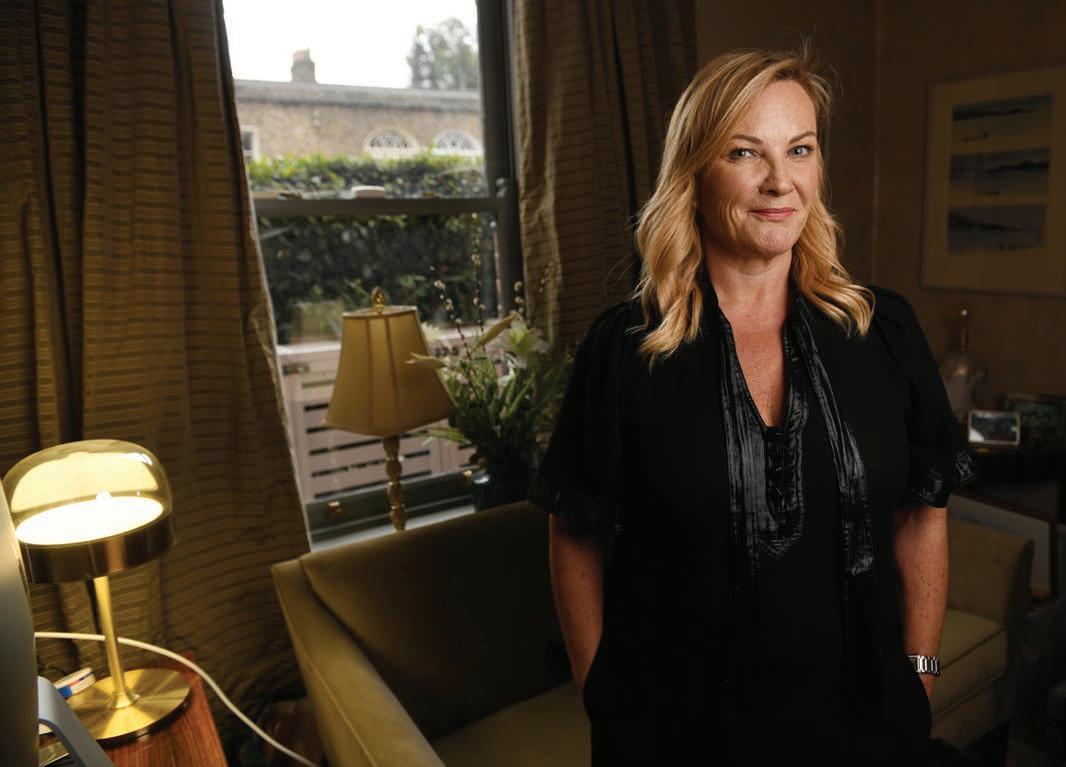
volunteer work. Most recently, you chaired the St. Patrick’s Festival in Dublin. What was the highlight of the festival for you?
Yes, I am very privileged to have been acting as Chair of the St Patrick’s Festival since early 2020. It has been a very challenging role for the last few years, particularly the 2020 Festival which we had to cancel with just a few days to go due to the pandemic. That was one crisis I could have done without. That said, seeing how the team responded and how they managed to pivot and put on an online Festival in 2021 with the widest ever reach was remarkable. The highlight though was definitely the return of the in-person Festival in March this year and in particular the opportunity to welcome the Ukrainian ambassador to Ireland to the Festival and to be able to convey the support of the Festival and the wider Irish public for the people of Ukraine on our national holiday which was only a few weeks after the invasion of Ukraine by Russia. That was a huge honour for me.
When and if you manage to find any spare time, what do you like to do to unwind?
I love nothing more that curling up with a good book either on a beach somewhere or in front of a roaring fire. I en oy travel and exploring new places but most of all I like to spend downtime surrounded by family and friends. I think post Covid that really is something I value more than anything else. P
the Parchment 35 Interview Autumn 2022 dsba.ie
Photography: Bryan Meade
The New Corporate Enforcement Authority
On July the Companies Corporate nforcement Authority Act the Act came into effect, with the establishment of a new Corporate nforcement Authority C A . Cian Clinch and Ciara O’Brien report on the new C A which many commentators say is a watershed moment in confronting economic and white-collar crime


The C A has not wasted any time and on July arrested a director following an investigation into the filing of false B Annual eturns. e faces three charges of providing false information contrary to s. of the Companies Act . This matter came before the Dublin District Court the same day and the director was remanded in custody.
Functions of the CEA
The functions of the Office of the Director of Corporate nforcement ODC have been incorporated into the C A. owever, while the ODC was previously under the Department of nterprise, Trade and mployment, the C A is a completely independent statutory agency with greater powers and an increased budget. The C A is required to encourage compliance with the Companies Act investigate suspected offences under the Companies Act, and suspected incidences of non-compliance with the Companies Act prosecute offences by way of summary proceedings refer cases to the Director of Public Prosecution DPP supervise the activities of liquidators and receivers.
Structure of the CEA
While the ODC was led by one Director, the Act provides that the C A will have no more than three full-time members , one of whom will be the outgoing Director of the ODC , appointed for a period of five years, renewable for another five years. In addition to this, there is provision under the Act for secondment of gardaí to the
C A, and recruitment of specialists such as legal, accounting and digital forensic professionals. This increase in staff is expected to bolster the C A efforts to investigate and take enforcement actions for breaches of company law.
Sanctions
nder s AB of the Act, the following sanctions can be imposed on directors, by way of Court Order
A direction to cease the conduct, and abstain from repeating the conduct
A direction prohibiting the director from performing functions in auditing, or public interest entities, for a maximum of three years
A fine, up to , to be paid to the C A.
The C A has also been empowered to publish particulars of sanctions imposed, the conduct that led to the sanctions, as well as details of relevant directors. This information will be published on the C A website and can only be anonymised in a number of limited circumstances. This type of name and shame strategy will certainly focus the mind to ensure a company’s affairs are in order.
The C A in its press statement has advised that it will also create an advocacy programme to provide information, guidance and resources to directors and other parties to assist compliance with Company law.
Conclusion
The creation of the C A is a noteworthy step to tackle economic and white-collar crime in Ireland. This marks a new era in terms of enforcement and prosecution in this area and it will be interesting to see what impact the C A will have in the coming months and years.
36 the Parchment Corporate Law
Cian Clinch is a partner and Ciara O’Brien is a solicitor in the Commercial & Business team at Hayes solicitors
P
would highly recommend any aspiring mediator to consider the MII Certi ed Professional Mediator Training Course with O’Sullivan Solutions. The course leader, Gerry O’Sullivan, is extremely profession al and a very experienced mediator who endeavours throughout the course to equip all participants with the necessary skills to become a professional and competent practising mediator. Gerry is also the author of the highly regarded ‘The Mediator’s Toolkit’ piece that ensures practitioners are best placed to formulate and deliver the right questions at mediation, be it in the context of an employment or family concern to a large commercial dispute.’

Beale






Co.








BECOME A CERTIFIED MEDIATOR ACCREDITED BY THE MEDIATORS INSTITUTE OF IRELAND ASSESMENT DATES 28TH OR 29TH MARCH 2023 VENUE: TBC COST: €2,450 PER PERSON FOR FULL DETAILS VISIT: WWW.DSBA.IE - WWW.OSULIVANSOLUTIONS.IE THE DSBA FAMILY LAW COMMITTEE ARE COLLABORATING WITH GERRY O'SULLIVAN OF O'SULLIVAN SOLUTIONS IRELAND TO TRAIN MEDIATORS COURSE DATES 25TH TO 27TH JANUARY 9TH AND 10TH FEBRAURY 9TH AND 10TH MARCH ‘I
Eoin Himpers-McLoughlin, Litigation Solicitor,
&
LLP
Menopause in the Workplace
There has been an increased discussion around menopause, its impact on female employees and the workforce in recent years. Sinead Morgan looks at the position

Menopause has occurred when a woman has had no menstrual cycles for twelve consecutive months. The period preceding the menopause is termed the perimenopause and generally occurs for between four and six years prior to the menopause.
This period is commonly known as going through the menopause . It is generally accepted that menopause affects women between and years of age, however it can occur much earlier for some women. It also accepted that many of the symptoms linked to menopause can have a negative impact on an employee’s health which can impact on their productivity at work. This was highlighted by a K study which found that of women who had been unwell as a result of the menopause had left their jobs. The spotlight was also placed on this issue in Ireland in after significant media coverage on the Liveline radio show. Following on from this publicity the menopause issue was incorporated into the Government’s Women’s Health Action Plan.
UK Case Law
Despite an increasing number of disability cases taken in the UK in relation to the menopause issue there has been no definite ruling as to whether the symptoms of menopause reach the threshold of a disability in the UK. In one of the more recent cases ooney v eicester ity ouncil - - - and
- - - , the Employment Appeal Tribunal held that the Employment Tribunal was wrong in finding that the Claimant’s menopausal symptoms were not severe enough to constitute a disability. The claim was then remitted to be considered by a new tribunal. A decision is awaited in that case. There is also a growing body of UK case law in relation to sex and age discrimination linked to the menopause.
Protected Grounds – Ireland
istorically Ireland has followed the K’s lead in relation to many employment issues. However, it is noteworthy that the definition of disability under the mployment quality Acts - A is broader than the K. Disability as defined by the EEA includes “both the total or partial absence of a person’s bodily or mental functions” and “a condition, illness or disease hich a ects a person s thought processes perception of reality emotions or udgement . It also includes a disability imputed to a person.
There is an argument to be made that menopause cannot be a disability as it is a natural part of the aging process. However, in circumstances where symptoms of the menopause include hot flushes, brain fog, fatigue, low mood, headaches, weight gain and joint pain it is entirely possible that menopause symptoms could be deemed to be a disability by the Workplace elations Commission W C in certain cases. There has been limited case law around the issue of menopause in Ireland to date. In otunda ospital v io han c ally the Complainant brought claims on grounds of gender
38 the Parchment
and disability alleging victimisation, non-provision of training, failure to provide reasonable accommodation and harassment. On the disability grounds the Complainant stated that she suffered from stress and the effects of the menopause. A final determination of the Labour Court is awaited in that case. In the case of nn ane v ealth ervice ecutive est the Claimant unsuccessfully alleged that she was discriminated against on age grounds in circumstances where menopause queries had been directed to her during an internal interview process. In that case the Labour Court held that no inference of discrimination could be drawn given that the complainant’s age was not referred to at any point.
Risks Relating to Menopause

• Prospective Claims
Typically, women who pass through the menopause suffer varying symptoms meaning that any case would need to be examined on its merits. Given the broad interpretation of disability by the W C it is likely that at least some cases would meet the threshold of a disability. Once a disability has been identified it will trigger an obligation by the employer to make a reasonable accommodation for the impacted employee. This accommodation could impact on a variety of issues such as working conditions and terms of employment. Given that menopause is an age-related condition and is linked to a specific gender, separate gender and age discrimination claims could also arise.
• ta Attrition
Given the current difficulty in acquiring and retaining staff in Ireland and the labour market gap employers may need to place a greater focus on retaining older, more experienced employees. In those circumstances employers need to be live to the fact that female employees impacted by menopause symptoms are more likely to remain if they feel supported within the workplace.
Next Steps
There are currently no additional health and safety obligations placed on employers in relation to menopausal employees other than the employer’s statutory duties under the Health, Safety and Welfare at Work Act, . aving said that, given the focus on this issue and the obvious risks attached to this category of employees, we would advise employers to consider taking proactive steps to support menopausal employees in order to mitigate against the risk of claims. Those steps could include raising awareness, carrying out risk assessments, providing training to managers to deal with issues that might arise around menopause, delivering that training and reviewing policies and procedures generally. Some organisations have gone one step further and introduced a Menopause Policy setting out an organisation’s approach to employees experiencing menopausal symptoms, and the supports those employees can expect to receive. It will be a decision for each employer to determine the most appropriate steps or supports to implement in their organisation.
the Parchment 39 Menopause Autumn 2022 dsba.ie P
Sinead Morgan is a senior associate at RDJ Solicitors
We would advise employers to consider taking proactive steps to support menopausal employees in order to mitigate against the risk of claims
Debt Recovery Update
Following the publication of the Courts Service Annual eport, Jason arte suggested at the time that would be remembered as a year like none other. owever, a year later, and following the publication of the Courts Service Annual eport for , he says that in a debt recovery context, very closely mirrors

It is probably easy to forget that the rolling public health restrictions initially introduced in March , in response to the Covid- pandemic, were also prevalent for much of . Most of us were confined to a km distance from our homes, and then within our county only, up to mid May . Widespread Covid- vaccinations only gained traction by June July . Accordingly, the social and economic disruption that the pandemic, and the ensuing public health restrictions, had led to in , are also reflected in the figures and broader trends, highlighted in the Courts Service eport. Indeed the eport , in the collections context, my analysis of the and numbers eerily match each other, year on year.
Judgments and Corresponding Enforcement Remedies
The number of monetary udgments obtained by creditors, in default of appearance or defence against debtors in , was extremely close to its equivalent. It is worth noting that this was about half of the same number that were obtained in . Breaking the total down, whilst there was a small rise in District Court default udgments, the combined igh and Circuit Court figure, was even down some on the level. The return to levels of legal collection and enforcement activity seen in the years prior to were certainly not a factor in .
This trend is also reflected across the figures set out in the eport for the usage of remedies that udgment creditors normally seek to avail of. These included
In , creditors took steps to publish some , udgments in the Central Office of the igh Court, mirroring the , in saw the commencement of , new Installment Order cases, almost uncannily reflecting the , in The volume of udgment mortgages registered, fell by in , compared to the previous year
Possession Litigation
We had commented upon the underlying Irish mortgage arrears problem in analysis of previous annual reports. The figure for proceedings issued by lenders, to repossess secured properties, on foot of the lender’s rights in a mortgage charge document, rose slightly in , to , from . owever, that figure was still ust a quarter of its equivalent, with the formal moratorium on repossessions during , spilling into an informal forbearance on such activity, in .
Personal Insolvency Activity
The trends in personal insolvency proceedings in also mirrored the equivalent, certainly from the creditor’s viewpoint. This is illustrated by numbers for creditor bankruptcy being ust below those issued
40 the Parchment
in . Personal insolvency was a sphere of legal activity that proceeded, very successfully from a logistics perspective, in a remote setting. This was reflected in the increase in the numbers of debtors petitioning for their own bankruptcy in . The overall volume of arrangements applied for pursuant to the Personal Insolvency Act as amended remained similar to its equivalent, in .
It’s interesting to note that the figures in the eport, for corporate insolvencies, be they examinerships, liquidations, direction restriction applications, etc., are almost identical. This is best illustrated by the fact that applications to wind up companies were received by the igh Court in both and .
Why did the Figures Remain so Low?
In my analysis of the Courts Service Annual eport, we cited a number of reasons for this. It is interesting to note that the eport itself refers to the temporary payment breaks by financial institutions as being one of the key continuing reasons for the lack of collection and enforcement activity through the Courts, in . The debt warehousing scheme offered by evenue in , continued into , as did many government supports for businesses with such supports preventing or postponing bad debt events or insolvencies.
It is worth noting that whilst many court hearings moved successfully to a remote hearing basis, in and , personal insolvency hearings being a good example, hearings in the debt recovery context where witness evidence was required were cancelled or postponed in those years.

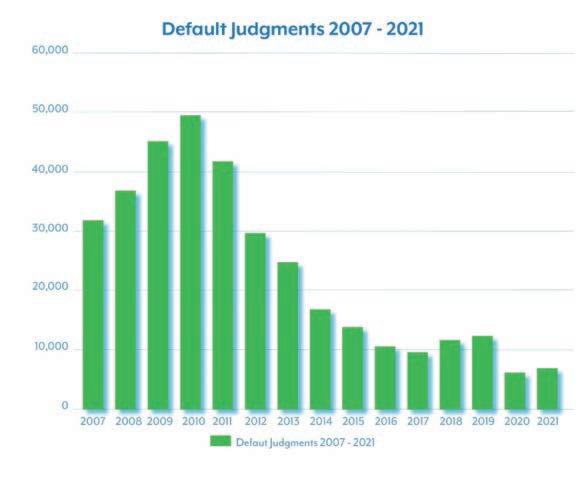
Anecdotally, my own practice also suggests that deliberate creditor forbearance, in the context of the pandemic and the public health restrictions in , was a key determinant in these numbers.
Comment
We have always suggested that there is a natural time lag, circa one to two years, from a change in the country’s economic cycle being reflected in the collection litigation and enforcement figures in the Irish Courts. The lifting of almost all Covidrelated public health restrictions in early , and the ending of government financial supports, suggest that the artificially low debt litigation and enforcement figures witnessed in and will not continue. Indeed, it is worth noting one statistic in the eport – that for incoming actions in the igh Court to recover debt – which increased by , belied the trend otherwise illustrated here.
Indeed, many commentators have suggested that the withdrawal of pandemic supports, supply chain disruption exacerbated by the war in kraine and soaring energy and fuel costs, will lead to a rise in bad debt and insolvencies in Ireland, ust as it has in the K. We would expect that the figures for insolvencies, collection litigation and enforcement will trend upwards for and believe that will see substantial increases.
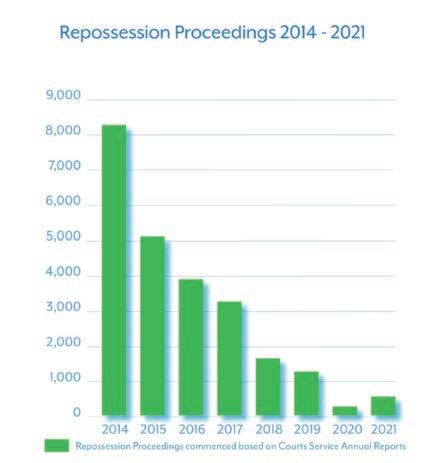
the Parchment 41 Debt Litigation Autumn 2022 dsba.ie P
Jason Harte is a partner at Mason Hayes & Curran and Head of the Debt Recovery Team
Important High Court Motion Rules to note
RULES OF THE SUPERIOR COURTS (PROCEDURE ON DEFAULT)
S.I.
A recent Law Society library LawWatch update, under the heading “New Legislation”, referenced the above-mentioned amendment to the Rules of the Superior Courts which was brought into effect by the Minister for Justice on the th September .
S.I. amends and renders even more perilous, for those acting for defendants in High Court litigation, strictures which were introduced by S.I. of , ules of the Superior Courts Procedure on Default .
If the new rules are applied strictly by the Court, and they will be, a default in delivery of defence in actions claiming unliquidated damages in tort or contract will, upon application to the Court by way of motion by the plaintiff, result in udgment against the defendant .for such speci c relief claimed in the statement of claim to hich the ourt considers the plainti to e entitled unless the ourt is satis ed for reasons to e recited in the order that
it is necessary in the interests of ustice that the time for delivery of the defence should e e tended in hich case ..
the Court . .shall to the e tent possi le determine the speci c relief claimed in the statement of claim to hich it considers the plainti to e entitled in the event of the failure of the defendant to deliver a defence . and shall make an unless’ order granting udgment against the defendant automatically in the event that it fails to deliver its defence within the extended time period.
Note, however O.27 R. 10 (4): f the defendant a elivers a defence to the plainti not later than days after the service of such notice of motion for udgment and odges a copy of the defence in the entral ce ith a certi ed copy of the notice of motion attached thereto not later than ten days efore the return date
the said motion for udgment shall not e put in the udges list ut shall stand struck out and the defendant shall pay to the plainti the sum of for his costs of the said motion for udgment.
The days of a first motion for udgment in default of defence invariably being struck out on the basis of an old-style order allowing further time for delivery of defence are well gone. At worst, the defendant will now have udgment in default of defence marked against it upon the first motion. At best, the court will extend time for delivery of defence but only where it is necessary in the interests of ustice . and .for reasons to e recited in the rder and even then, an unless’ udgment will be granted against their defendant in the event that its defence is not delivered within the permitted extension period and filed in the Central Office.
imon c leese is a partner at imon c leese olicitors
Liam Moloney Elected PEOPIL Vice-President
Liam Moloney, Managing Partner of Moloney Co Solicitors, has been elected as the new ice-President of the Pan uropean Organisation of Personal In ury Lawyers P OPIL . e is the first Irish lawyer to hold the position.

P OPIL is one of the largest Personal In ury Lawyers’ Association in urope
with over members from urisdictions within urope and seven urisdictions outside urope. Its core ob ectives are to promote greater access to ustice for in ury victims and to enhance udicial co-operation in all uropean urisdictions in the field of Personal In ury Law.
42 the Parchment
2022,
454/2022
DSBA Hill Walk
The DSBA hill walk hike took place recently in beautiful autumn sunshine up the Dublin mountains with breathtaking views over the City.


Led by DSBA president Diego Gallagher, colleagues, family members and canine loved ones assembled at the Blue Light pub car park where we navigated a circular loop of about minutes duration before ending

conveniently from where we ventured and where Matthew Kenny had organised some food and refreshments.
We were fortunate in being expertly guided all the way up and down the foothills by High Court Judge and local resident Tony O’Connor. We hope to continue with this initiative in the future.
evin iggins
Practice Observation for Conveyancers
As a specialist family law solicitor, I regularly receive enquiries from unmarried parties who are living together and whose relationship has broken down. Frequently the enquirer is stunned to learn that their former partner may have rights as a Cohabitee under the Civil Partnership and Certain Rights and Obligations of Cohabitants Act , which commenced in January . In all cases, the enquirers have stated that they were not advised by their conveyancing solicitor in respect of the Act when purchasing their property. The Act provides a redress scheme for cohabitants whose relationship ends through separation or death. A cohabitant may apply to Court for maintenance, pension ad ustment orders, property ad ustment orders or a share in the estate assets of a cohabitant who has died.
Advice in respect of the Act needs to be given to all people purchasing a property, and of the option of entering into a Cohabitation Agreement, when they are purchasing a property, regardless of whether they are in a relationship or not. It’s important to note that in the case of MW v DC IC A the Court – in considering what constitutes living together – stated it would look at all the circumstances and that the parties don’t have to be physically living together day by day. Although clients may consider their relationships to be “unregulated”, under the Act a partner may acquire rights without either party intending such rights to be bestowed. nless parties contract out of the Act they fall under it if they satisfy the definition of a cohabitant. ltimately, a
party seeking redress under the Act may not be successful however, that may only be determined after lengthy Court proceedings.
I believe this is a serious area of potential risk for solicitors carrying out conveyancing. In order to protect against this risk it may be prudent for Conveyancers to include a question in the Purchaser’s uestionnaire regarding relationship status which is broader than married or single . Also, Conveyancers may wish to consider including a reference to the Act in their initial advices to a purchaser to ensure that they have given the advice and are therefore covered if it was raised in the future.
vril angan is rincipal of angan ompany olicitors
the Parchment 43 News Autumn 2022 dsba.ie
Time Matters
The Court of Appeal COA has upheld an Order of the igh Court striking out the plaintiff’s claim for inordinate and inexcusable delay Doyle v Foley I CA . The plaintiff’s claim arose out of a Syndicate Agreement for a share purchase in a stallion standing at the defendant’s stud farm. The stallion was leased to a stud in France in and was ultimately purchased by the French stud in .
The plaintiff issued proceedings in January claiming damages for breach of contract, negligence, breach of duty and specific performance in respect of the Syndicate Agreement Proceedings . Thereafter the relevant chronology is as follows
January Statement of Claim delivered February defendant raised otice for Particulars

June plaintiff secured an interim in unction preventing the defendant from selling the stallion prior to the conclusion of the Proceedings July in unction vacated August plaintiff replied to e oinders April plaintiff filed otice of Intention to Proceed

March plaintiff issued motion to remit the Proceedings to the Circuit Court
March plaintiff issued fresh otice of Intention to Proceed February plaintiff issued second motion to remit the Proceedings May defendant issued motion to strike out the Proceedings Application .
Two periods of delay formed the basis of the Application from August to April , a period of three years and eight months First Period , and from April to February , a period of two years and ten months Second Period .
Applicable Legal Principles
The igh Court Court and the COA determined the Application by reference to the principles set out by amilton CJ in Primor Plc v Stokes Kennedy Crowley I Primor .Was there inordinate delay .Was the delay inexcusable .If the answer to both questions is yes, where does the balance of ustice lie
The Court concluded that the First and Second Periods amounted to inordinate and inexcusable delay on the part of the plaintiff. The Court concluded that there was no active delay on the defendant’s part and that any inactive delay should not be counted against the defendant .
On the balance of ustice, the Court noted that the case was not a pure documents case, it would require oral testimony and held that a fair trial was not possible. The Court struck out the Proceedings.
COA - Inordinate and Inexcusable Delay
On appeal to the COA, the plaintiff conceded that the delay was inordinate but argued that it was excusable upon four grounds xplanations , namely the .time taken up with the taxation of costs from the interim in unction application .plaintiff’s ill health .plaintiff’s solicitor’s ill health and .lack of clarity in the defendant’s response to the application to remit the Proceedings to the Circuit Court.
The plaintiff also argued that the defendant had acquiesced in the delay by not issuing a motion to dismiss, and that he would suffer no pre udice as this was a documents case .
The COA re ected that these explanations ustified or excused the delay. The issue of recovering the costs
44 the Parchment
Joanne yan and Lulu Trainor review a recent Court of Appeal that dealt with Inordinate and Inexcusable Delay
of an interim in unction was not relevant to the progress of the proceedings. The evidence of the ill health of the plaintiff and his solicitor was insufficient to explain why the case could not proceed during the First Period, especially when the plaintiff and his solicitor were able to progress the proceedings both before and after that period.
The COA was critical of the failure by the plaintiff to advance any evidence in support of his argument that individually the xplanations may not excuse the delay, but when taken together, they do. In re ecting this argument, the COA reiterated the earlier words of Denham CJ that seven times zero is still zero .
In terms of the Second Period, save for seven months when the plaintiff sought the defendant’s consent regarding the application to remit, and the separate one-month periods under the otices of Intention to Proceed, a delay of two years and one month was not excusable.

COA – Balance of Justice aving established that the total delay of five years and nine months on the part of the plaintiff was inordinate and inexcusable, the Court went on to consider whether the balance of ustice lay in favour of striking out the Proceedings. Part of the balancing exercise involves weighing a plaintiff’s constitutional right of access to the court, against the defendant’s constitutional rights to fair procedures and the timely resolution of litigation. It also involves consideration of the greater public interest in ensuring the timely and effective administration of ustice. Inherent in the assessment of the balance of ustice is the asserted pre udice to either party.
In terms of the degree of pre udice which must be established by a defendant seeking to have proceedings struck out for inordinate and inexcusable delay, the COA, adopted the findings of Barniville J and Irvine J in recent urisprudence, and held that where the defendant proves culpable delay on part of the plaintiff, the defendant need only prove moderate pre udice arising from that delay. Once inordinate and inexcusable delay has been established, the defendant does not have to prove pre udice to the point that it faces a significant risk of an unfair trial modest pre udice suffices.
The COA held that the defendant established moderate pre udice should the case proceed to trial. This was a general pre udice inherent in a trial regarding matters that occurred between and and which would require critical issues to be resolved by oral testimony. In the court’s view, this sufficed to establish that the balance of ustice lay in favour of dismissing the proceedings. The COA refused the appeal.
Conclusion
The decision illustrates the courts’ intolerance for inordinate and inexcusable delay in the prosecution of proceedings. The decision also affirms the courts’ approach to dismissal applications, namely that each case depends on its own facts. Litigants should be mindful of the confirmation from the COA on the degree of pre udice a defendant must show to succeed in an application to strike out proceedings. Where a defendant establishes inordinate and inexcusable delay on the part of a plaintiff, they need only demonstrate that they would suffer moderate pre udice if the case proceeded to trial.
the Parchment 45 Litigation Autumn 2022 dsba.ie P
Once inordinate and inexcusable delay has been established, the defendant does not have to prove pre udice to the point that it faces a significant risk of an unfair trial modest pre udice suffices
Joanne Ryan is an associate and Lulu Trainor is a trainee in the Litigation and Dispute Resolution Department at William Fry
Dishonesty and Misconduct
The Court of Appeal recently issued a udgment in the case of Law Society of Ireland v Daniel Coleman, which deals with the issue of dishonesty in professional regulatory proceedings. Aisling ay examines the udgment of Binchy, J, in which Whelan, J and Faherty, J concurred

The case of a ociety -v- oleman I CA had a protracted history and involved an appeal by a solicitor whose name was struck from the oll of Solicitors by Order of the High Court dated December , following findings made by the Solicitors Disciplinary Tribunal. The decision of Simmons J. in the High Court concluded that the Tribunal findings were legally sustainable and an Order was made striking the solicitor’s name from the oll of Solicitors, in circumstances where the solicitor has signed the name of a colleague on a series of contracts for sale, without the knowledge or consent of that solicitor colleague, with the intention of deceiving a lending institution. Two core arguments were advanced by the solicitor in the Court of Appeal, which were, firstly, that the proceedings before the Tribunal were contaminated by procedural unfairness resulting in the admissions of the solicitor being unreliable, and secondly, related to the findings of dishonesty made by the Tribunal, which the solicitor claimed were flawed in three respects;
.The pleading of dishonesty was inadequate, indeed not pleaded expressly
.The Tribunal and igh Court made a finding of dishonesty without identifying any test for same;
.The trial udge had made a finding of dishonesty on a strict liability basis.
We will consider below the important aspects of the Court of Appeal’s udgment, in particular in respect of the Court’s decision relating to dishonesty and misconduct, and its impact on professional regulatory proceedings where the conduct of the professional contains elements of dishonesty and the requirements of professional regulators when framing
allegations of misconduct that are on their facts capable of being found to be dishonest.
Dishonesty
The Solicitors Disciplinary Tribunal the Tribunal found that the solicitor was guilty of misconduct. No specific’ mention of findings of dishonesty were made by the Tribunal in its findings.
Misconduct under section d of the Solicitors Amendment Act is defined as “conduct tending to bring the solicitors’ profession into disrepute”. Counsel for the solicitor argued that because no party had in fact suffered any financial loss as a result of his actions, these actions could not be regarded as dishonest.
It was also submitted on behalf of the solicitor that there is an obligation, in circumstances where dishonesty is being alleged by a regulatory body, that it must always be pleaded with particularity and reliance was placed on English and Welsh authorities by the solicitor.
The Court of Appeal distinguished between the rules governing the professional regulatory regime here and in England and Wales. Binchy J held that the trial judge was correct in concluding that the English and Welsh authorities submitted on behalf of the solicitor on this issue were of little assistance, given what was described as the very real differences in the regulatory regimes applicable to solicitors in this country and in England and Wales, having regard to the differing rules and procedures in that jurisdiction and those that apply in this urisdiction, including our constitutional dimension.
As regards the alleged failure of the trial udge to apply a test for dishonesty, the solicitor contended that his actions did not constitute misconduct, though accepted that some allegations, connoted dishonesty. The solicitor argued that the trial judge had failed to adequately apply a test for dishonesty. Binchy J noted
46 the Parchment
that a test in circumstances whereby the solicitor admitted that his actions were capable of being objectively assessed as dishonest served no useful purpose in this case.
The case of Law Society v Kathleen Doocey was cited with approval by Binchy J as regards whether dishonesty is a matter to be considered objectively or subjectively.
In Doocey, misconduct was admitted, but dishonesty was denied, the opposite of the current case. Donnelly J. in the Doocey case noted that dishonesty is to be udged on an ob ective standard, based on the standards of the community as to what constitutes dishonesty, with a limited subjective element relating to the state of the individual’s belief or knowledge as to the facts.
As the solicitor admitted that his actions were capable of being ob ectively assessed as dishonest, the fact that the trial judge in the present case did not expressly apply an ob ective test was irrelevant. Therefore, the finding that the solicitor had acted in a manner constituting dishonest misconduct was the “rational and indeed unsurprising conclusion” given the circumstances of this case.
Misconduct
The Court of Appeal also considered the issue of how allegations of misconduct should be framed by regulators.
The trial judge had referred to O’Laoire v. Medical Council in which the Court noted the onus of proof lay upon the regulator to prove beyond reasonable doubt every relevant averment of fact which was not admitted by the respondent practitioner and to establish beyond reasonable doubt that such facts, as so proved or admitted, constituted professional misconduct.
owever, the trial udge noted that this was not
Practice
authority for the proposition that a regulator must prove, to a criminal standard, facts which are admitted by a respondent practitioner. Thus, the absence of the word “dishonesty” in this particular case was no defence to the charge of misconduct.
In light of the above, it was held that a strict analogy with criminal proceedings is of limited assistance. Provided that the requirements of natural justice are met, the obligation on the regulator is not the same as that of a prosecutor in criminal proceedings. What is required in professional regulatory proceedings is that the respondent practitioner is clearly on notice of the case that has to be met, as was the case here where it was noted that the solicitor fully understood and addressed the allegations made against him and had effectively conceded the core allegations of placing the name of a colleague on fictitious contracts with the intention of misleading a financial institution.
Conclusion
It is clear from this judgment that professional regulators must ensure that all allegations they are bringing against members of their professional body, while not necessarily required to be expressed to the same standard as in a criminal indictment, must nonetheless be expressed clearly as to the case to be met by the respondent practitioner, both in terms of fact and law. The respondent practitioner must be clear as to the precise nature of the allegations that must be met.
Therefore, best practice for regulators, in cases where the facts disclose potentially dishonest conduct, is to expressly plead in the allegations of misconduct, not only what the respondent practitioner is alleged to have committed, but to include express reference to “dishonesty” in the allegations from the beginning.

the Parchment 47
Management/Litigation Autumn 2022 dsba.ie P
Aisling Ray is an associate in Fieldfisher’s Public and Regulatory Department
The respondent practitioner must be clear as to the precise nature of the allegations that must be met
Leadership in the era of Remote Working
With remote working appearing to be here for the long haul, Dr Melrona Kirrane looks at the challenges for leaders and sets out five key ideas

The essence of effective leadership is the capacity to influence individuals and groups towards achieving organisational goals. So leadership, in essence, is a social influence process. ere I would like to firstly share five key ideas of what lies beneath this process and then consider the additional demands of leaders in a virtual work environment.
The first idea is that good leaders have good character. By that I mean they are competent and have integrity. Competence comes in many forms, but the competencies that are particularly relevant for leadership include the capacity for analysis, communication and negotiation as well as expertise and personal fortitude. Integrity is a confluence of ethical behaviour, respect and honesty and a high degree of coherence between the values of courage, temperance, justice, prudence and humility. While we may all know leaders who do not reflect these character dimensions, good leaders embody them and this is what sustains the well-being of the people around them and the organisations in which they work.
The second key idea is that there is no one best way to lead. We all have to find our own personal leadership style and brand for an authentic expression of leadership. That said, there are numerous theories of effective leadership that can certainly help identify behavioural pathways for leaders. One popular approach is called Transformational Leadership. This identifies four I’ of essential behaviours of effective leaders. The first is Inspirational motivation where a leader articulates an appealing vision and highlights the purpose and meaningfulness of tasks. The second is
Individualised consideration, where the leader attends to followers’ needs and concerns and acts as a mentor and coach to others. Thirdly is Idealised influence, where the leader acts as a role model and provides a consistent sense of mission and values. Finally, Intellectual stimulation is where the leader seeks input on problems and solutions and encourages curiosity and innovation. These four behaviours can be a helpful platform from which leaders can begin to build their own personal leadership style that applies across all situations.
The third key idea is that adaptability is the route to longevity. We live in a volatile, uncertain, complex and ambiguous world and a leader’s job is to respond to such environmental dynamics in a manner that is appropriate and effective. This means a leader must be flexible, adaptive and proactive and eschew one set of fixed responses that may have been effective in more stable times. The hybrid work environment demands such adaptability from leaders. Critical new behaviours required here include a focus on communication norms rather than behavioural norms; regular interaction and feedback, clarity concerning teamwork processes, good data, faster detection of problems and mistakes, and although it may sound like a contradiction, formal time for informal interaction.
The fourth key idea is that the leader’s role is to be a catalyst for all elements in the leadership situation to coalesce and result in goal achievement. This means getting out of the way of the operators, embedding the cultural values of the organisation in all activities and aligning everyone’s work with
48 the Parchment
the strategic intent of the organisation. There are two elements that enhance a leader’s capacity to be a catalyst that I would emphasise. One is emotional intelligence, or EQ. This concerns your awareness of yourself and how you use this awareness to exert self-control. It also incorporates social awareness, which refers to your ability to pick up social cues and use them to enhance your interactions with others. Happily, unlike cognitive ability, or IQ, evidence suggests that emotional intelligence can be enhanced via training programmes or using insights from authors such as Daniel Goleman. The second element that supports your role as a catalyst is fostering psychological safety in your work environment. This means modelling curiosity, remembering you are fallible, and emphasising learning as much as doing. Together, emotional intelligence and psychological safety will serve your effectiveness as a catalyst in the hybrid work environment.

The final idea is that leaders are self-made – they are not born but can be developed and should be focused on as a project of work over one’s lifetime as a leader. One route to enhancing your leadership is to seek out crucible experiences’. These are tough challenges that make you dig deep to show yourself what you are made of and boost your confidence to aim even higher the next time. Another route is to enroll in a leadership development programme like the one I designed and developed for female leaders at DC https business.dcu.ie course leadershipdevelopment-for-women . It’s a programme for women simply because men and women approach leadership differently and studies show that all-female learning environments are particularly enriching for women.
So these five key ideas form the bedrock of effective leadership in any context. But the remote working environment calls for an additional type of leadership, known as e-leadership, which requires the development of further distinct abilities. In this context, leaders, or e-leaders’, need to be more democratic in providing access to information and maintaining open communication channels. They need to establish a suitable social climate and demonstrate exemplary interpersonal skills. -leaders also need to address the teams’ social-emotional needs and promote healthy teams through frequent interactions. They should demonstrate a more inclusive leadership style where employees feel free to present their ideas, allowing them to participate in the decision-making process and encourage autonomy, collaboration, and responsibility. They must create a positive work atmosphere with a sense of connectedness within the group. This is facilitated by maintaining clear norms of communication, having regular interaction with the teams, providing positive feedback, avoiding ambiguous messages, and conducting good supervision of each member’s contribution.
-leaders should develop tolerance for ambiguity and be creative in establishing the organisational structures and processes that ensure that all members of virtual teams are working for the shared objective. They should not be anxious about distributing the leadership well within their team and allow all team members take responsibility and assume authority
to consider both their own spheres of work and the entire project.
Most importantly, effective e-leadership is characterised by building trust with each member of the team. Trust takes a long time to build up and can be supported by applying the ideas from the ABCD model of trust. A stands for Able’ which refers to the demonstration of your ability or competence in a specific domain. B refers to Believable’ such that you act with integrity. C refers to Connected’ and relates to how much you share of yourself in a personal sense with others, and D refers to Dependable’ which means honouring your commitments. Leaders must find opportunities to demonstrate these behaviours on a daily basis and so build trust among members of their work unit.
It may also be helpful to think about TRUST as a mnemonic, with T standing for Transparency, where there are no hidden agendas, full information is provided, you say what you mean, enable disclosure and encourage connection. R stands for respect which enables people to speak up when there’s a problem, and share creative solutions. It involves a mindset shift from power OVER to power WITH. U stands for understanding others by standing in their shoes and seeing things from other perspectives. S stands for shared success such that team members value working together to achieve collective goals. Finally, T stands for truth whereby honesty characterises interactions.
esearch in the field of e-leadership is still in its infancy, but the ideas shared above should support leaders’ transition to the e-leadership space. As leaders commit to building skill in the competencies outlined and become more proficient in demonstrating them in their behaviour, the well-being of their teams and organisations can be enhanced.
the Parchment 49 Leadership Autumn 2022 dsba.ie P
Dr Melrona Kirrane is associate professor of Organisational Psychology at DCU Business School
-leaders should develop tolerance for ambiguity and be creative in establishing the organisational structures and processes that ensure that all members of virtual teams are working for the shared objective
Consumer Representative Actions Take Shape – but who will pay?

Consumer-facing businesses, particularly those operating in sectors which are sub ect to regulation, are bracing themselves for a potential increase in consumer litigation following the publication of the General Scheme of epresentative Actions for the Protection of the Collective Interests of Consumers Bill the Scheme . Julie Murphy-O’Connor and isín Peart look at some key elements of the Scheme, including the incongruity it would appear to create in terms of how actions of this potential magnitude might be funded in Ireland
Background
Ireland has been moving closer to the introduction of a form of consumer class action since the draft epresentative Actions Directive - Directive on epresentative Actions for the Protection of the Collective Interests of consumers, and repealing Directive C COM the Directive was published in .

The implementation of the Directive will fundamentally alter the commercial litigation landscape in Ireland, and across urope, by enabling consumers to act collectively and harmoniously in claims concerning a wide range of consumer-facing industries, including financial services, technology and health. The new mechanisms will also allow a wider application of class actions to data privacy breaches than is currently provided by Article of the General Data Protection egulation and section of the Data Protection Act .
Recent Progress
The Directive came into force on December with a deadline of months for Member States to transpose it into their domestic law. Prior to the publication of the Scheme, it was unclear to
what extent Ireland would choose to implement the Directive, which allowed a considerable amount of discretion to individual Member States. owever, we now have a clearer picture of what the act is likely to look like, sub ect to any amendments which might be made as it proceeds through the legislative process.
Pre-legislative scrutiny of the Scheme was commenced by the Joint Committee on nterprise, Trade and mployment on June . When that process is complete, the Bill will be formally drafted and we will have more clarity on its precise provisions. It will then pass through the D il and the Seanad before being signed into law by the President. The Directive requires the new law to be operational in each Member State by June at the latest.
Key Elements
Types of Actions: The new law will apply to actions taken under a wide-ranging list of consumer protection legislation against any business that deals with consumers. The list of legislation has not been amended or expanded from what was set out in the Directive but that was already quite expansive and covered most areas of consumer law, including financial services, technology and health.
50 the Parchment
Retrospection: The Directive provides that the new regime will only apply to actions brought after June but it appears possible that those actions could be based on alleged infringements of law which took place before June - Article of the Directive Transitional Provisions states that it will apply to representative actions brought on or after June . Article goes on to provide that certain provisions in relation to the suspension of limitation periods for in unctions will only apply to claims based on infringements that occurred on or after June . Given that Article does not mention the timing of the infringements that might form the basis of a representative action brought on or after June , it might be inferred that those infringements may occur prior to that date. Businesses need to be mindful of this element of retrospection as we move closer to the implementation date.
uali ed entities Actions can only be brought by a qualified entity as designated by the Minister for nterprise, Trace and mployment and cannot be initiated by private law firms. Ministerial regulations will be enacted to deal more specifically with the designation process but broadly speaking, qualified entities must be independent properly constituted
and solvent operating for at least months in the consumer protection area and be non-profit – a key criterion we will be looking at in more detail. Designation will be reviewed every five years. ross- order Several qualified entities can come together to bring cross-border actions and the uropean Commission will maintain a list of qualified entities from each Member State for that purpose. edress In Ireland, actions can be taken in the igh Court for in unctive relief and or financial redress. Consumers do not have to opt-in to representative actions for in unctive relief but they must expressly opt-in to representative actions for monetary redress. In reality, this could mean that consumers might wait for the outcome of the in unction hearing before ultimately electing to oin the redress action and a successful in unction could therefore have the potential to precipitate a significant increase in the number of consumers participating. Limitation periods are suspended while the in unction is being determined to ensure that consumers’ rights to proceed to redress are preserved.
Consultation: The Scheme requires traders to engage in pre-litigation consultation to resolve the alleged breach and the court will only authorise a representative action

the Parchment 51 Litigation Autumn 2022 dsba.ie
Julie Murphy-O’Connor is a partner in the Dispute Resolution Team at Matheson Róisín Peart is a professional support lawyer at Matheson
Consumers might wait for the outcome of the in unction hearing before ultimately electing to oin the redress action
Litigation
The key message for businesses operating in urope is that it has never been more important to re-evaluate, enhance and implement strong governance and compliance systems and ensure operational resilience and effective enterprise risk management processes

to proceed if that process fails to yield an agreement. Alternative dispute resolution is encouraged but not required for that purpose.
Costs: Other than charging a modest entry fee to consumers to oin an action which will be designated by further regulations , qualified entities must bear the costs of any actions brought under the Scheme and costs will be awarded by the courts in accordance with the loser-pays principle. Again, this is a key criterion we will discuss further below. There is provision for partial costs orders to be made against individual consumers if their intentional or negligent conduct results in a party incurring costs.
u lication Once an action proceeds to redress after the in unction stage, any settlement reached between the parties must be approved by the court. The Scheme requires traders to inform the consumers concerned of any approved settlement, though it does not specify what level of detail might be required to be given. A qualified entity is also required to publish information in its website on the outcomes of the representative actions it has brought. The Directive refers specifically here to the importance of the reputational risks associated with such publication in acting as a deterrent for traders infringing consumer rights and businesses should be aware that it will be difficult to resolve disputes which have proceeded to redress stage in a discreet manner.
Funding
We have referred in our previous briefings to the fact that the funding of litigation by third parties who have no interest in the dispute is prohibited under Irish law. So, particularly with costs being awarded under the Scheme on a loser-pays principle, the question arises as to how a non-profit organisation might be expected to fund litigation of this potential magnitude in Ireland.
The Directive expressly requires Member States to ensure that the costs associated with taking a representative action do not create a financial obstacle and it is suggested that court fees should be limited and access given to legal aid or public funding. owever, when you look at how this requirement is being implemented under the Scheme – while it does provide for regulations to be made to remove court fees, there is no scope in its current form for any type of public funding or legal aid. The Scheme does contain a provision for third party funding of
representative actions insofar as permitted under rish law”. owever, it is difficult to see what the practical purpose of that provision is in circumstances where most forms of third party funding are not permitted as a matter of Irish law, unless it is to provide for future change.
The udiciary has been calling for legislative intervention to provide for the possibility of third party litigation funding in Ireland for some time. In January a oint report by the Bar Association and the Irish Society for uropean Law was published which strongly recommended that proper provision be made for litigation funding as an essential mechanism to access ustice. Similar recommendations were made in A eview of Civil Justice report, known as the Kelly eport, in December . This eport makes over recommendations to improve the Civil Justice system in Ireland. The Government has most recently, on May , published an implementation plan for the Kelly eport which indicates no further policy change in relation to litigation funding apart from a limited form of third party funding for insolvency practitioners. The Kelly eport implementation plan does provide for legislation to be drafted next year to allow for a limited form of third party funding for liquidators, receivers, administrators under the Insurance o. Act , the Official Assignee and trustees in bankruptcy to fund proceedings that are intended to increase the pool of assets available to creditors . We will await the publication of a further report and recommendations from the Law eform Commission, so it seems unlikely that there will be any substantive change in the law before the Scheme comes into effect next year.
Separately, the Kelly eport implementation plan provides for legislation to be drafted in for the introduction of a comprehensive multi-party action procedure, similar to the Group Litigation Order process in the K, by . So either way, collective actions will likely be a feature of the very near future of litigation in Ireland.
Conclusion
Businesses should begin to prepare now for the implementation of this new collective redress procedure, particularly given the potential for actions under the Scheme to apply to infringements prior to it coming into force. The key message for businesses operating in urope is that it has never been more important to re-evaluate, enhance and implement strong governance and compliance systems and ensure operational resilience and effective enterprise risk management processes. This will be the first and best line of defence against funded class actions aimed at defending consumer interests.
Whilst a lack of availability of third party funding in Ireland may, for the time being, act as an effective bar to collective redress proceedings being brought here, qualified entities in Ireland are not restricted to bringing proceedings in their own urisdiction. It will be open to them to bring cross-border actions in other Member States where third party funding is permitted, or to oin in cross-border actions with other qualified entities if they have a branch or consumer domiciled in that alternative Member State.
52 the Parchment
P
Lady








Solicitor’s Lunch Friday 4th November 2022 for Lady Solicitors in the Kildare & University Club 17 St. Stephen’s Green, Dublin 2 at 1pm. Drinks Reception at 12.30pm. For bookings and more information please contact maura@dsba.ie or Tel: 01 670 6089. TO ADVERTISE CONTACT: SHARON HUGHES TEL: 086 871 9600 E: SHARON@256CONTENT.COM
New Directors’ Duties –Take Note
On July , the uropean nion Preventative estructuring egulations the egulations were introduced which gave effect to Directive on restructuring and insolvency the Directive . Lorna Osborne reviews the legislation and say that the Directive’s principal objective is to ensure that all member states have comparable and effective frameworks in place for early warning and prevention of corporate insolvency
The Regulations amend a number of provisions of the Companies Act the Act relating to examinerships in order to transpose requirements of the Directive. Interestingly, the Regulations have also amended the Act to provide that, for the first time, directors of companies now have a statutory duty to consider the interests of creditors during the period approaching insolvency.
Directors’ Duties During Insolvency
Traditionally, a general rule of Irish corporate law was that a director of a company owes certain fiduciary duties to the company, and the company alone. This principle is codified under Section of the Act which provides:
“a director of a company shall owe the duties set out in section the relevant duties to the company and the company alone .
Section of the Act codified the fiduciary duties of directors and includes a duty to act in good faith, to act honestly and responsibly, to avoid conflicts of interest and to exercise care, skill and diligence in conducting the affairs of the company.
However, under Irish common law, there is a modification to this general rule where the company is insolvent and the directors are aware of the insolvency.
It is well established under Irish case law that, when a company is insolvent and the directors are aware of the
insolvency, the directors have a duty to have regard to the interest of the company’s creditors. However, until the introduction of the Regulations, this duty to have regard to creditors’ interest had not been recognised under statute.
New Statutory Duty in Favour of Creditors

The Regulations amend the Act by introducing a new section A and a new section i into the Act. New section 224A requires a director of a company ‘who believes, or who has reasonable cause to believe’ that the company is, or is likely to be, unable to pay its debts to have regard to:
•the interests of the creditors;
•the need to take steps to avoid insolvency; and
•the need to avoid deliberate or grossly negligent conduct that threatens the viability of the business of the company.
ew section of the Act has been amended to introduce a new directors’ duty which provides that a director of a company shall “have regard to the interests of its creditors where the directors become aware of company’s insolvency”.
The provisions are significant – not only do they put the common law duty to have regard to creditors’ interests on a statutory footing, section 224A also creates two additional duties for directors i to have regard to the need to take steps to avoid insolvency;
54 the Parchment
and ii to have regard to the need to avoid deliberate or grossly negligent conduct that threatens the viability of the business of the company.
Enforceability of the new Duties
As with the existing directors’ duties under the section 228 of the Act, the new statutory duty to have regard to creditors’ interest is owed to the company and the company alone. This means that creditors will have no direct right of action against a director for a breach of his her new statutory duty. A breach of this directors’ duty will most likely be enforced by a company acting through its liquidator.
A director found to be in breach of his her fiduciary duties may be liable to account to the company for any gain made directly or indirectly from the breach and or to indemnify the company for any loss that occurred as a result of the breach.
Introduction of Early Warning Tools
The egulations also inserted a new section A into the Act which provides that a director may have regard to ‘early warning tools’ which alert directors to circumstances that could give rise to a likelihood that the company will be unable to pay its debts and can identify restructuring frameworks available to the company and signal to such directors the need to act without delay.
owever, the new section A does not give any indication into what these “early warning tools” involve and it should also be noted that this provision is not imperative – it merely states that directors may have regard to early warning tools without setting out any consequences should a director choose not to consider such tools.
Conclusion
These amendments to the Act provide some welcome clarity on the extent of directors’ duties leading up to and during the period of insolvency and helpfully establish, on a statutory footing, that these duties are owed to the company and the company alone.

It should be noted that Section A went beyond the common law duty to have regard to the creditors’ interest and introduced two new duties i to have regard to the need to take steps to avoid insolvency; and ii to have regard to the need to avoid deliberate or grossly negligent conduct that threatens the viability of the business of the company. It will be interesting to see how these novel duties will be interpreted by the Irish courts.
In the meantime, company directors who are concerned about the company’s ability to pay its debts or its financial stability should be cognisant of, and seek legal advice in relation to, their new statutory duties.
the Parchment 55 Company Law Autumn 2022 dsba.ie P
Lorna Osborne is a managing associate at Addleshaw Goddard Solicitors Lorna is a member of the DSBA Commercial Law Committee
Section A also creates two additional duties for directors i to have regard to the need to take steps to avoid insolvency; and ii to have regard to the need to avoid deliberate or grossly negligent conduct
IS THIS YOUR COPY OF THE PARCHMENT?
ARE YOU ON OUR MAILING LIST?
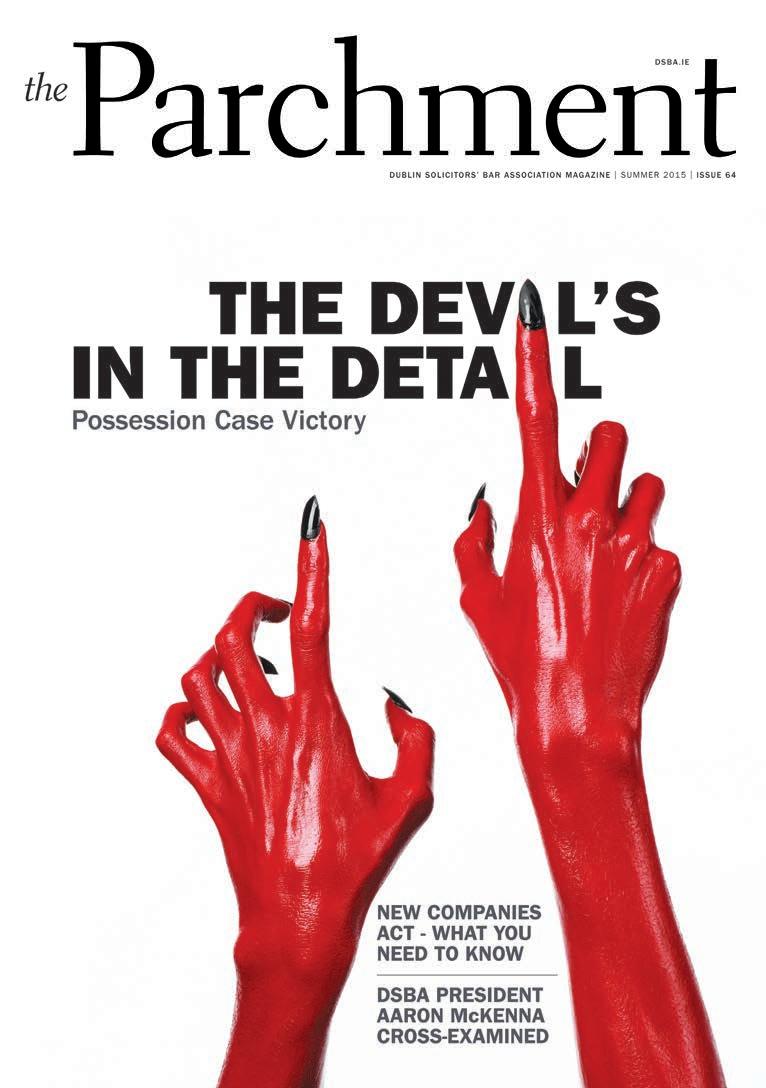

If not, please contact Maura Smith.
If not, please contact Maura Smith
Dublin Solicitors Bar Association, 1st Floor, 54 Dawson Street, Dublin 2, Ireland.
Dublin Solicitors Bar Association, Unit 206, The Capel Building, Mary’s Abbey, Dublin 7, Ireland.
01 670 6089
01 670 6089
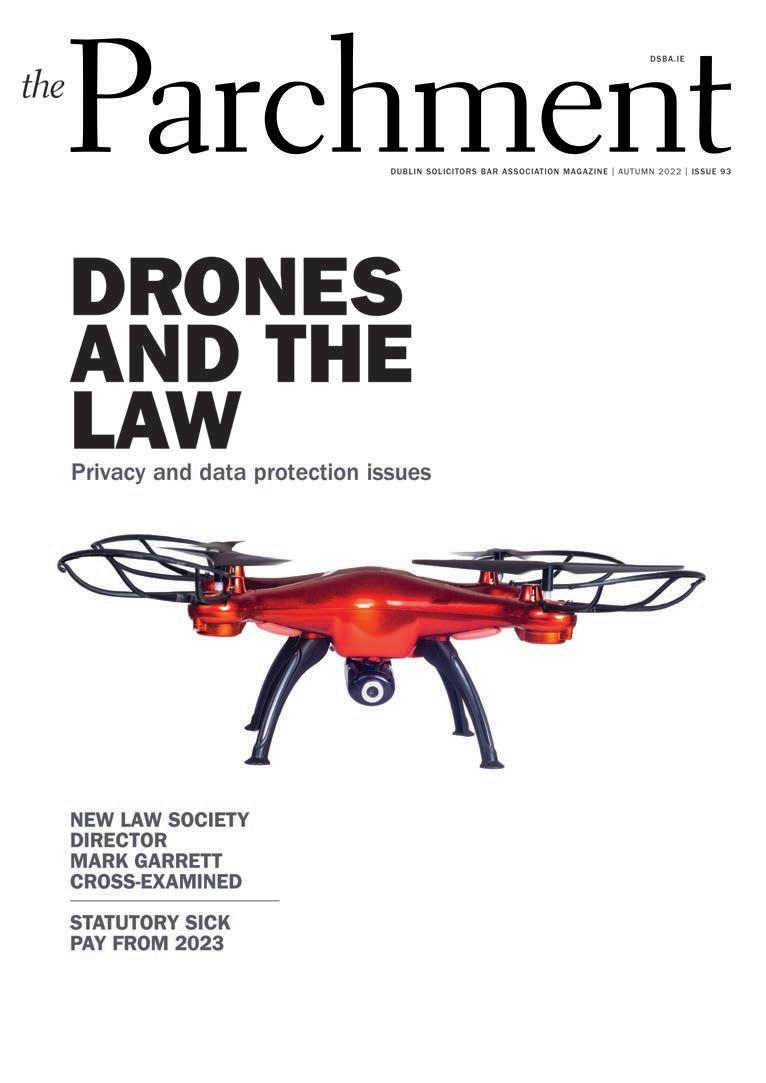
E-Mail: info@dsba.ie


E-Mail: info@dsba.ie


your personal details online at:
Update your personal details online at:
Tel:
•
• Update
www.dsba.ie
Tel:
•
•
www.dsba.ie
DSBA Seminar

Left to right: Angela McCann, Solicitor, Michelle Linnane, Solicitor, Susan Martin, Solicitor, Judge John O’Hagan (Retired), Brian Sugrue, BL & Killian O’Reilly
DSBA Litigation Seminar
The DSBA’s Litigation Committee hosted a seminar on the 1st June 2022 entitled “Litigation and Commercial Leases.” The speakers were Angela McCann, McCann Morrissey Clarke, Michelle Linnane, Consultant, Susan Martin, Martin Solicitors and Brian Sugrue BL. The Seminar was chaired by retired Judge, John O’Hagan.



Right: James O’Mahony, Shannon & O’Connor Solicitors, Redmond Arigho, L K Shields and Killian O’Brien, Bowler Geraghty & Co

Far right: Speakers Angela McCann and Michelle Linnane
Left: Aideen Dennehy, Smith Foy & Partners, Martin Ceillier, M & B Ceillier and Deirdre Walsh, Chief State Solicitor’s Office
Far left: Susan Martin, Speaker and Eva Mackin, Transport Infrastructure Ireland


the Parchment 57
Autumn 2022 dsba.ie
Photography: Owen O’Connor
Left: Mel Ferguson, Sheehan & Co, Eoghan Flynn, Sheehan & Co and Kevin Kennedy, Miley & Miley
Far left: Eugene O’Connor, Rolleston McElwee Solicitors and Peter Hennessy, Byrne Wallace LLP
DSBA Probate Seminar
The DSBA Probate Committee hosted a seminar on the 6th July 2022 entitled “Probate Litigation”. The speakers at the Seminar included Declan Whittle BL, Anne Marie Maher BL and Susan Martin, Martin Solicitors. The Seminar was chaired by Ms Justice Nuala Butler of the High Court.

Left to right: Speakers (L to R): Declan Whittle BL, Anne Marie Maher BL, Ms Justice Nuala Butler, Susan Martin and Caitriona Gahan, Lavelle Partners
Left: Philip O’Riada, O’Riada & Co. Solicitors, Kevin O’Higgins, Kevin O’Higgins Solicitors, Kay Cogan, Cogan Daly & Co and Martin Moran, Martin Moran & Co
Far left: Deirdre Smith, Office of the General Solicitor for Minors and Wards of Court and Anne Cunningham, O’Doherty Warren
Right: William Crowe, M M Halley & Son, Monika O’Doherty, M M Halley & Son and Mary Kilcullen, KIlcullen & Associates

Far right: Darach Connolly, M E Hanahoe Solicitors, Beverly Turner, Taylor & Buchalter and Brian Devaney, Devaney & Partners

Left: Eamonn Carney, Carney McCarthy and Harry Mooney, Harry Mooney & Co

Far left: Caitriona Gahan, Lavelle Partners and Avril Scally, Lavelle Partners



58 the Parchment
Photography: Owen O’Connor
DSBA Seminar
DSBA Seminar
Left to right: Speakers (L to R): Jim Ryan, Anti Money Laundering Advices, Laura Fannin, Advices on GDPR for Solicitors’ Practices, Niall Cawley, Proposals on Amendments to the Solicitors Accounts Regulations and Joan Doran, Chairperson
Right: Deirdre Smith, Office of the General Solicitor for Minors and Ward of Court, Mary Cullen, Cullen & Co and Kay Cogan, Cogan Daly & Co

Far right: Cathal Young, Cathal N Young O’Reilly & Co and Adeline Tuffy, State Claims Agency
DSBA Practice Management Seminar
The DSBA’s Practice Management Committee hosted a seminar on the 21st July 2022. The speakers were Jim Ryan, Investigating Accountant Law Society; Laura Fannin, Hayes Solicitors LLP and Niall Cawley, Niall T. Cawley & Co




Left: Stephen Maher, Stephen Maher Solicitors, Manus McClafferty, Maguire McClafferty and Michael Curneen, Curneen Solicitors

Far left: Triona Cody, O’Mara Geraghty McCourt and Paul Marren, Martin E.Marren Solicitors

the Parchment 59
Autumn 2022 dsba.ie
Photography: Owen O’Connor
Left: Laura Fannin, Speaker, Niall Cawley, Speaker and Ursula Geraghty, Doyle Geraghty & Co
Far left: Rory O’Neill & Jim Ryan, Law Society of Ireland
DSBA Annual Conference
The DSBA held a very successful annual conference in Lisbon, Portugal from the 15th to 18th September 2022. The Gala Dinner took place at the Casa Museu Medeiros e Almedia where a superb evening was had by all.







60 the Parchment
Left: Deirdre O’Sullivan and Áine Hynes
Far left: Deirdre O’Sullivan, David and Patricia Walley, Tony O’Sullivan
Left: Michael Moran and Olivia McCann Far left: Paul and Siobhan Keane
Left to right: DSBA President Diego Gallagher, João & Fillipa Pinheiro da Silva
Right: Catherine White and Liz Dowling
Far right: Michael Webb, Anita Gallagher and Caroline Bergin








the Parchment 61 Autumn 2022 dsba.ie
Left: Anne Leech, Majella Dolan and Gaye Higgins
Far left: Kevin O’Higgins and President of the Law Society Michelle Ní Longáin
Left: Gena and Dan O’Connor
Far left: Judge Dermot Simms and Sinead Kearney
Right: Sharon McElligot, Fiona Kerins, Catherine White and Marion Campbell
Far right: Inga and John Grif n
Right: Caroline Knightly and Eamonn Shannon
Far right: Mary Neylon and Nora McCarthy
DSBA Annual Conference
The DSBA held a very successful annual conference in Lisbon, Portugal from the 15th to 18th September 2022.

The business session took place in the magni cent headquarters of the Portuguese Bar Association. See page 64 for report.
Left to right: Geoffrey Graham, Edge International Law Firm and Chair of the Ireland Portugal Business Network, President Waterford Bar Olivia McCann, 2022 DSBA President Diego Gallagher, President of the Portuguese Bar Association Prof Dr. Luís Menezes Leitão, João Pinheiro da Silva, Partner, CMS Law, Law Society of Ireland President Michelle Ní Longáin, Sandra Teixeira Arsénio, Associate,CMS Law, 2020 DSBA President Tony O’Sullivan and 2021 DSBA President Joe O’Malley

Left: Law Society President Michelle Ní Longáin and Dan O’Connor


Far left: Keith Walsh, Eamonn Shannon, David Walley and Patricia Walley


Far left: John Lacy, Evanna Killeen and Joe Clancy

62 the Parchment
Left: Geoffrey Graham and DSBA Vice President Susan Martin
Right: Deirdre McDermott, Mary McCarthy and Liz Dowling
Far right: Katharine Kelleher, Sinead Kearney and Monika Leech







the Parchment 63 Autumn 2022 dsba.ie
Far left: Morette Kinsella and David Bergin
Left: John Hennessy, Niall Cawley, Ciara O’Kennedy, Avril Mangan, Sharon McElligott and Rory O’Riordan
Far left: Joe O’Malley and Ruadhan Killeen
Right: Deirdre O’Sullivan, DSBA President Diego Gallagher, João Pinheiro da Silva, Sandra Teixeira Arsénio, and Tony O’Sullivan
Right: Olivia McCann and Matthew Kenny Far right: Phil McCarthy, Eimear O’Doherty and Judge Dermot Simms
DSBA Portugal Conference a Great Success
The DSBA Annual Conference made a welcome return to our post-pandemic calendar
While originally planned for by then President Tony O’Sullivan, it was deferred to the following year under President Joe O’Malley as, like the rest of the world, we waited to see how things would pan out. Joe then made the correct decision to defer again. Our - President Diego Gallagher then found himself in the fortunate position of having a ready-made Conference good to go! That’s the theory. The reality, of course is that while the hotel and dates and costings had been finalised the not inconsiderable time and effort in planning for the business session had yet to be forged.

Those of us fortunate to have been there in the magnificent headquarters of the Portuguese Law Society at Sal o obre, Ordem dos Advogados Portugueses, at Largo S o Domingos in Lisbon, will have seen the effort put in by Diego. We were welcomed by Mr. Baston rio da Ordem dos

Advogados Portugueses, Prof Dr. Luís Menezes Leit o and DSBA President, Mr. Diego Gallagher.
Our Portuguese guests were hugely welcoming and agreed with Diego that strong links existed between both urisdictions. There then followed a talk on Portuguese eal state Acquisition and disposal by local colleagues Mr. Jo o Pinheiro da Silva, Partner and Ms. Sandra Teixeira Ars nio Lawyer, CMS Law Firm.
Mr. Geoffrey Graham, Senior Partner DG International Lawyers and Chair of the Ireland Portugal Business etwork then spoke on an interesting theme entitled The Dragon & The Tiger 80 years of Portuguese and Irish trade. Geoffrey himself is an Irish lawyer who has been practising in Lisbon for years.
The business session then concluded with a most interesting interaction between DSBA President Diego Gallagher, his two immediate past Presidents, Joe O’Malley and Tony O’Sullivan and ice President Susan Martin on Developments in Practice Management and Future Challenges.
64 the Parchment News
Kevin O’Higgins is principal of Kevin O’Higgins Solicitors. He is a former President of both the Law Society and the DSBA. He is a former editor of the Parchment
P


IF LIFE GIVES YOU LEMONS WE’RE HERE TO HELP Consult a Colleague now in total confidence Call us on 01 284 8484 All calls to the Consult A Colleague helpline are treated in the strictest confidence - there is no need to give a name or number. A confidential free service from the DSBA. www.consultacolleague.ie
CORT





cort@cortsite.com www.cortsite.com 01 683 1927 CORT2019 CORTBase Requisitions on Title Case & Risk Management Legal Accounts CORTBase
Software for Solicitors Innovative - Affordable - Reliable Innovative design making this the easiest and the fastest legal accounts system available today Simple user interface and dedicated support line to help you maximise efficiency and productivity Approved by the DSBA and licensed by the Law Society of Ireland to reproduce the Requisitions on Title




















































































 By Michael Boylan
By Michael Boylan

 By Simon Mills, Aideen Ryan, Colm Scott-Byrne
By Simon Mills, Aideen Ryan, Colm Scott-Byrne





























































































































































